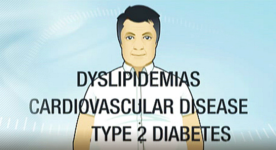Recent Contributions

The value of time: The more you move, the lower your risk to develop type 2 diabetes
The wide benefits of being regularly engaged in physical activity to prevent or delay cardiometabolic diseases have been known for decades. However, accurately measuring physical activity in epidemiological research has been challenging as it primarily relied on self-report questionnaires, the limitations of which have been documented in several studies. Indeed, self-report questionnaires often lead to … Continued See More
Visceral adiposity: a key driver of non-alcoholic fatty liver disease
Liver fat accumulation/non-alcoholic fatty liver disease (NAFLD) is a highly prevalent condition and has become a major cause of liver failure. Imaging studies have shown that excess liver fat is frequently accompanied by an excess of abdominal visceral adipose tissue. Excess visceral adiposity is associated with an increased risk of type 2 diabetes and cardiovascular … Continued See More
Eat well and move: another success story!
Being physically active and having a high-quality dietary pattern are two key features of our lifestyle associated with a healthier cardiometabolic risk profile, contributing to longer and healthier lives. However, beyond their individual influence on cardiometabolic risk, what about the mortality risk associated with these two important markers of our lifestyle when they are simultaneously … Continued See More
NAFLD and cardiometabolic outcomes: contribution of excess visceral adiposity
Many studies worldwide have reported a close relationship between a high-risk obesity pattern, visceral obesity, and an altered cardiometabolic risk profile beyond total adiposity. Moreover, excess visceral adiposity is a significant risk factor for both cardiovascular disease (CVD) and type 2 diabetes. Non-alcoholic fatty liver disease (NAFLD), another prevalent condition frequently observed among patients with … Continued See More
Cardiovascular health: Sleep well, live well!
In 2010, the American Heart Association (AHA) introduced the concept of Life’s Simple 7 to define ideal cardiovascular health. This proposal was a major paradigm shift, which moved the focus from cardiovascular disease risk management to the promotion of cardiovascular health. Among the Life’s Simple 7’s criteria, we find not only biological risk factors (healthy … Continued See More
Further evidence that cardiorespiratory fitness is a vital sign!
Cardiovascular disease (CVD) as well as cancer are two major causes of mortality worldwide. Despite the pharmacotherapies and increasingly specialized techniques available to the medical community to manage these chronic diseases, it is also important to intervene upstream in order to prevent their development. Adopting a healthy and active lifestyle, which benefits in the prevention … Continued See More
Low-fat diet versus Mediterranean diet in secondary prevention: What is the best option?
Nowadays, medical treatment for cardiovascular disease (CVD) involves a comprehensive set of procedures and drug therapies. However, lifestyle habits remain important to target in order to optimally manage CVD risk. To further explore this issue, the investigators of the CORDIOPREV study have compared the effects of a low-fat diet versus a Mediterranean diet on the … Continued See More
Daily step count and mortality: A meta-analysis of 15 international cohorts provides new data
It is well documented that regular physical activity is associated with a lower risk of morbidity and mortality related to chronic diseases such as cardiovascular disease, type 2 diabetes and pulmonary diseases. Furthermore, a physically active lifestyle also considerably improves quality of life. As a very simple measurement of physical activity, daily step count has … Continued See More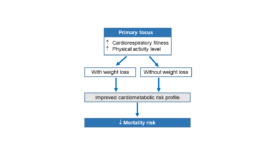
Should weight loss be the primary target to reduce health risk?
The worldwide prevalence of overweight and obesity is a source of concern and we have no evidence that this situation will improve in the short term. Multiple weight loss programs have been developed and several of them include dietary and physical activity/exercise components. However, most approaches have generated mixed results over the long term as … Continued See More
Socio-economic disparities and physical inactivity
The harmful consequences of physical inactivity on morbidity and mortality are well documented. Physical inactivity is an independent risk factor for premature mortality and many chronic diseases such as type 2 diabetes, cardiovascular disease and certain types of cancer. Although the beneficial impact of having a physically active lifestyle is recognized, a significant proportion of … Continued See More
Benefits of physical activity and mortality: Beyond the waistline
The acute and long-term benefits of physical activity have long been recognized. Through improvements in glucose-insulin homeostasis, lipoprotein-lipid profile and many other metabolic pathways, physical activity promotes health and reduces the risk for the development of chronic societal cardiometabolic diseases such as type 2 diabetes and cardiovascular disease, with beneficial consequences on mortality. Moreover, it … Continued See More
Healthy lifestyle habits: a focus of the American Heart Association
Things change… and hopefully for the better! A lot of progress was made over the last decades in our understanding of the pathophysiology of chronic diseases such as type 2 diabetes and cardiovascular disease. Nowadays, patients who have access to medical procedures and treatments in the field of cardiology can enjoy a much longer life … Continued See More
New dietary guidance from the American Heart Association
More than a decade ago, a strategic committee chaired by the current president of the American Heart Association (AHA), Dr. Donald Lloyd-Jones, proposed a paradigm shift in cardiovascular medicine: move the focus from the battle against cardiovascular disease (CVD) (although legitimate) to the promotion of cardiovascular health. In order to achieve this strategic goal, ideal … Continued See More
The ICCR salutes the vision of the AHA leadership in promoting primordial prevention!
More than a decade ago, a strategic committee chaired by the current president of the American Heart Association (AHA), Dr. Donald Lloyd-Jones, proposed a paradigm shift in cardiovascular medicine: move the focus from the battle against cardiovascular disease (CVD) (although legitimate) to the promotion of cardiovascular health. In order to achieve this strategic goal, ideal … Continued See More
Celebrating the 100 years of the Physiological Reviews journal
Physiological Reviews, a review journal of the American Physiological Society, celebrates this year its 100th anniversary. The journal addresses topics relevant to various disciplines such as physiology, neuroscience, cell biology, and is targeted at basic scientists and clinicians with an interest in pathophysiology. Physiological Reviews is published quarterly and its 2020 impact factor reached 37.312. … Continued See More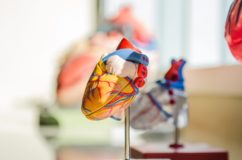
The study of atherosclerosis using tools of the 21st century: The PESA study
Valentin Fuster is an outstanding academic cardiologist who needs no introduction. The scope of his work and the contribution of his team to the management and prevention of cardiovascular disease is simply remarkable. In a recent review article published in the high-impact Journal of the American College of Cardiology, for which he also acts as … Continued See More
The discovery of insulin: Our humble tribute
Insulin is certainly a star among the hormones involved in human metabolism. Indeed, before the discovery of this remarkable hormone made by Banting, Best, Macleod and Collip in 1921, the deficit in insulin production of patients living with type 1 diabetes had devastating consequences on their quality of life and they would tragically die at … Continued See More
Editorial: Surviving COVID-19: Do not forget physical activity!
The benefits of being physically active have been known for years. Regular physical activity reduces the risk of developing chronic cardiometabolic “lifestyle” diseases such as type 2 diabetes as well as cardiovascular and respiratory diseases. Considering the current COVID-19 pandemic, examining the additional benefits that regular physical activity could provide is particularly relevant. Using the … Continued See More
Editorial: Your parents were right! Eat all your veggies and have some fruits!
For decades, several national and international dietary guidelines emphasized consumption of vegetables and fruit as a component of a healthy diet. Many public health campaigns have therefore been launched to promote the importance of eating fruits and vegetables on a daily basis. Despite these efforts, our current fruit and vegetable intake remains suboptimal, particularly among … Continued See More
Could you discuss the issue of beverages in diet?
Expert opinion by Benoît Lamarche, PhD, FAHA, Professor, Institute of Nutraceuticals and Functional Foods, Université Laval, Québec, QC, Canada See More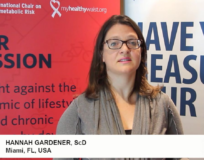
Is there a link between heart health and brain health?
Expert opinion by Hannah Gardener, ScD, Associate Scientist, Department of Neurology, University of Miami Miller School of Medicine, Miami, FL, USA See More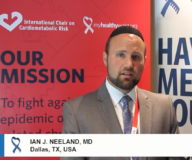
Could you comment on the link between body fat depots and the risk of developing cancer?
Expert opinion by Ian J. Neeland, MD, Assistant Professor, Department of Internal Medicine, University of Texas Southwestern Medical Center, Dallas, TX, USA See More
Could you comment on the various tools to estimate visceral adiposity?
Expert opinion by Soo Lim, MD, MPH, PhD, Associate Professor, Division of Endocrinology and Metabolism, Seoul National University Bundang Hospital, Seongnam, South Korea See More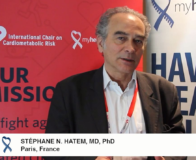
Is epicardial adipose tissue an epiphenomenon or a new player in the pathophysiology of atrial fibrillation?
Expert opinion by Stéphane N. Hatem, MD, PhD, Professor, Heart Institute of Pitié-Salpétrière Hospital; Director, INSERM/University Pierre-Marie-Curie Research Laboratory (UMRS 1166), Paris, France See More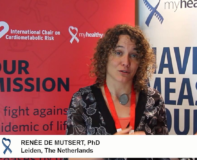
Could you comment on the respective role of visceral obesity and insulin resistance in the etiology of atherosclerosis and cardiovascular disease?
Expert opinion by Renée de Mutsert, PhD, Assistant Professor, Department of Clinical Epidemiology, Leiden University Medical Center, Leiden, The Netherlands See More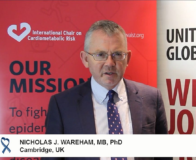
What are the best clinical tools to estimate the physical activity level and nutritional quality?
Expert opinion by Nicholas J. Wareham, MB, PhD, Professor and Director, MRC Epidemiology Unit, University of Cambridge, Cambridge, UK See More
What type of solutions should we implement to combat the epidemic of chronic societal diseases?
Expert opinion by Saverio Stranges, MD, PhD, FAHA, Professor and Chair, Department of Epidemiology and Biostatistics, Schulich School of Medicine & Dentistry, Western University, London, ON, Canada See More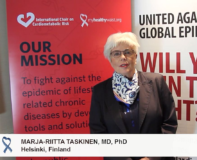
Can lifestyle (diet, exercise) have a rapid (positive or negative) impact on liver fat content and function?
Expert opinion by Marja-Riitta Taskinen, MD, PhD, Emerita Professor of Medicine, Research Programs Unit, Diabetes and Obesity, University of Helsinki, Helsinki University Hospital, Helsinki, Finland See More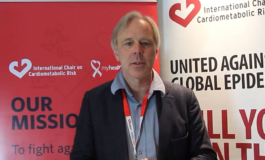
Could you briefly describe the wonderful initiative that you lead in Amsterdam to combat obesity?
Expert opinion by Jaap Seidell, PhD, Professor, Department of Health Sciences, Amsterdam Public Health Research Institute, and the EMGO Institute for Health and Care Research, VU University Amsterdam, Amsterdam, The Netherlands See More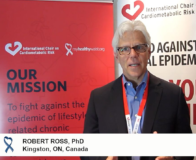
Do we need BMI specific waist cut-off values and why?
Expert opinion by Robert Ross, PhD, Professor, School of Kinesiology and Health Studies, Department of Medicine, Division of Endocrinology and Metabolism, Queen’s University, Kingston, ON, Canada See More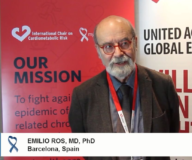
What are the first cross-sectional results of the PREDIMED-PLUS study?
Expert opinion by Emilio Ros, MD, PhD, Director, Lipid Clinic; Senior Consultant, Endocrinology and Nutrition Service, Hospital Clínic, Barcelona, Spain See More
What is more important: reducing sedentary time or promoting physical activity?
Expert opinion by I-Min Lee, MD, MPH, ScD, Professor, Brigham and Women’s Hospital, Harvard Medical School, T.H. Chan School of Public Health, Boston, MA, USA See More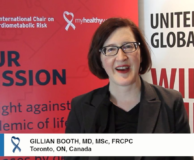
You are the minister of health and you want to deal with this epidemic of type 2 diabetes: what are your priorities and why?
Expert opinion by Gillian Booth, MD, MSc, FRCPC, Associate Professor, Department of Medicine, University of Toronto; Adjunct Scientist, Institute for Clinical Evaluative Sciences, Toronto, ON, Canada See More
What do you think is the most dangerous risk factor: being sedentary or having a low cardiorespiratory fitness and why?
Expert opinion by Steven N. Blair, P.E.D., FACSM, Professor (retired), Departments of Exercise Science and Epidemiology and Biostatistics, Arnold School of Public Health, University of South Carolina, Columbia, SC, USA See More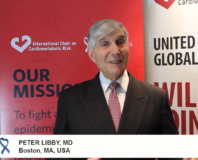
Could you discuss on the beneficial impact of lifestyle habits in the prevention and management of cardiovascular disease?
Expert opinion by Peter Libby, MD, Mallinckrodt Professor of Medicine, Harvard Medical School, Boston, MA, USA See More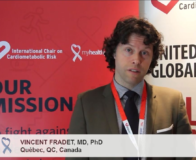
Do you think that, beyond drug therapy, lifestyle changes are important in the management of certain types of cancer?
Expert opinion by Vincent Fradet, MD, PhD, Associate Professor, Faculty of Medicine; Research Scientist, Cancer Research Centre, CHU de Québec, Université Laval, Québec, QC, Canada See More
Should we talk about the deleterious impacts of the consumption of energy drinks in public health messages?
Expert opinion by Benoit Arsenault, PhD, Professor, Faculty of Medicine, Université Laval, Centre de recherche de l’IUCPQ, Québec, QC, Canada See More
What are the new vital signs that should be measured in clinical practice and promoted in public health messages?
Expert opinion by Jean-Pierre Després, PhD, FAHA, FIAS, Scientific Director, ICCR, Professor, Division of Kinesiology, Université Laval, Centre de recherche de l’Institut universitaire de cardiologie et de pneumologie de Québec, Québec, QC, Canada See More
Could you discuss the respective contributions of food quantity vs. food quality?
Expert opinion by Benoît Lamarche, PhD, FAHA, Professor, Institute of Nutraceuticals and Functional Foods, Université Laval, Québec, QC, Canada See More
How can we optimally prevent a decline in cognitive function with age?
Expert opinion by Hannah Gardener, ScD, Associate Scientist, Department of Neurology, University of Miami Miller School of Medicine, Miami, FL, USA See More
Could you comment on ethnic differences in susceptibility to visceral adiposity and metabolic complications in the Dallas Heart Study?
Expert opinion by Ian J. Neeland, MD, Assistant Professor, Department of Internal Medicine, University of Texas Southwestern Medical Center, Dallas, TX, USA See More
Editorial: Waist circumference as a vital sign in clinical practice is being recognized in a global consensus paper published in Nature Reviews Endocrinology
Although many studies published over the last decades have consistently shown that a large waist circumference is associated with a deteriorated cardiometabolic risk profile predictive of an increased risk of morbidity and mortality, it is still not systematically measured in clinical practice. In 2017, the International Atherosclerosis Society (IAS) and the International Chair on Cardiometabolic … Continued See More
Is there a peculiar susceptibility to visceral obesity and related complications among Korean compared to Japanese or Chinese individuals?
Expert opinion by Soo Lim, MD, MPH, PhD, Associate Professor, Division of Endocrinology and Metabolism, Seoul National University Bundang Hospital, Seongnam, South Korea See More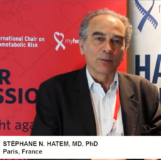
Is lifestyle important in the etiology of atrial fibrillation and what should we pay attention to?
Expert opinion by Stéphane N. Hatem, MD, PhD, Professor, Heart Institute of Pitié-Salpétrière Hospital; Director, INSERM/University Pierre-Marie-Curie Research Laboratory (UMRS 1166), Paris, France See More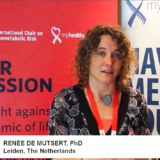
What are the environmental correlates of visceral obesity in the NEO Study?
Expert opinion by Renée de Mutsert, PhD, Assistant Professor, Department of Clinical Epidemiology, Leiden University Medical Center, Leiden, The Netherlands See More
What do you think is the most important in the etiology of type 2 diabetes: obesity or lack of physical activity?
Expert opinion by Nicholas J. Wareham, MB, PhD, Professor and Director, MRC Epidemiology Unit, University of Cambridge, Cambridge, UK See More
Is the prevalence of resistant hypertensive individuals overestimated considering the poor tools that we have to measure nutritional quality in clinical practice?
Expert opinion by Saverio Stranges, MD, PhD, FAHA, Professor and Chair, Department of Epidemiology and Biostatistics, Schulich School of Medicine & Dentistry, Western University, London, ON, Canada See More
Could you tell us why the liver is such a central and key organ in the etiology of the atherogenic dyslipidemia associated with excess visceral adiposity?
Expert opinion by Marja-Riitta Taskinen, MD, PhD, Emerita Professor of Medicine, Research Programs Unit, Diabetes and Obesity, University of Helsinki, Helsinki University Hospital, Helsinki, Finland See More
How is the Netherlands doing as opposed to other European countries in terms of obesity and lifestyle habits?
By Jaap Seidell, PhD, Professor, Department of Health Sciences, Amsterdam Public Health Research Institute, and the EMGO Institute for Health and Care Research, VU University Amsterdam, Amsterdam, The Netherlands See More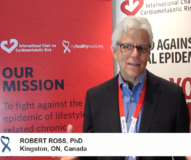
How should we use waist circumference in clinical practice?
Expert opinion by Robert Ross, PhD, Professor, School of Kinesiology and Health Studies, Department of Medicine, Division of Endocrinology and Metabolism, Queen’s University, Kingston, ON, Canada See More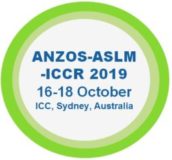
Editorial: Lifestyle, obesity and health: News from Australia!
The International Chair on Cardiometabolic Risk (ICCR) co-organized an international conference in collaboration with the Australian and New Zealand Obesity Society (ANZOS) and the Australasian Society of Lifestyle Medicine (ASLM). The ANZOS-ASLM-ICCR 2019 conference was held in Sydney, Australia from October 16 to 18. Through this partnership, the ICCR was able to contribute to the … Continued See More
Could you comment on the design of the PREDIMED-PLUS study? What are the key additional questions to be addressed by the PREDIMED-PLUS study?
Expert opinion by Emilio Ros, MD, PhD, Director, Lipid Clinic; Senior Consultant, Endocrinology and Nutrition Service, Hospital Clínic, Barcelona, Spain See More
Could you comment on the discrepancy between reported and measured physical activity levels?
Expert opinion by I-Min Lee, MD, MPH, ScD, Professor, Brigham and Women’s Hospital, Harvard Medical School, T.H. Chan School of Public Health, Boston, MA, USA See More
As a clinician, could you comment on the gap between clinical approaches and population-based approaches to manage/prevent type 2 diabetes?
Expert opinion by Gillian Booth, MD, MSc, FRCPC, Associate Professor, Department of Medicine, University of Toronto; Adjunct Scientist, Institute for Clinical Evaluative Sciences, Toronto, ON, Canada See More
Are there simple ways to assess cardiorespiratory fitness in clinical practice?
Expert opinion by Steven N. Blair, P.E.D., FACSM, Professor (retired), Departments of Exercise Science and Epidemiology and Biostatistics, Arnold School of Public Health, University of South Carolina, Columbia, SC, USA See More
As a clinician and a scientist, could you comment on the future challenges of atherosclerosis research?
Expert opinion by Peter Libby, MD, Mallinckrodt Professor of Medicine, Harvard Medical School, Boston, MA, USA See More
Do you think that lifestyle habits play an important role in the development of various types of cancer and why?
Expert opinion by Vincent Fradet, MD, PhD, Associate Professor, Faculty of Medicine; Research Scientist, Cancer Research Centre, CHU de Québec, Université Laval, Québec, QC, Canada See More
Do you believe that the fight against the overconsumption of sugar-sweetened beverages in some countries is over?
Expert opinion by Benoit Arsenault, PhD, Professor, Faculty of Medicine, Université Laval, Centre de recherche de l’IUCPQ, Québec, QC, Canada See More
What should we do to decrease the risk of chronic societal diseases?
Expert opinion by Jean-Pierre Després, PhD, FAHA, FIAS, Scientific Director, ICCR, Professor, Division of Kinesiology, Université Laval, Centre de recherche de l’Institut universitaire de cardiologie et de pneumologie de Québec, Québec, QC, Canada See More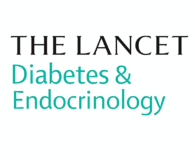
Editorial: Visceral obesity as a risk factor for chronic societal disease is being recognized in a global consensus paper published in the prestigious medical journal The Lancet Diabetes and Endocrinology
In 1983, using computed tomography, an imaging technique that was not used at the time for measuring body fat, a team of researchers from the Department of Internal Medicine at Osaka University led by Prof. Yuji Matsuzawa showed for the first time that there were substantial individual differences in the way human beings would store … Continued See More
Does nut consumption contribute to nutritional quality?
Expert opinion by Benoît Lamarche, PhD, FAHA, Professor, Institute of Nutraceuticals and Functional Foods, Université Laval, Québec, QC, Canada See More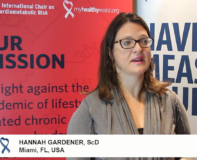
What are the key risk factors for dementia?
Expert opinion by Hannah Gardener, ScD, Associate Scientist, Department of Neurology, University of Miami Miller School of Medicine, Miami, FL, USA See More
Editorial: SAVE THE DATE! The ANZOS-ASLM-ICCR 2019 Joint Scientific Meeting will be held in Sydney, Australia, from 16 to 18 October 2019
The ANZOS-ASLM-ICCR 2019 Joint Scientific Meeting will be held in Sydney, Australia, from 16 to 18 October 2019 at the International Convention Centre in Sydney. This year sees the coming together of 3 outstanding organisations in the Australian New Zealand Obesity Society (ANZOS), the Australasian Society for Lifestyle Medicine (ASLM) and the International Chair on … Continued See More
What is the most dangerous lipid depot: visceral adipose tissue or liver fat?
Expert opinion by Ian J. Neeland, MD, Assistant Professor, Department of Internal Medicine, University of Texas Southwestern Medical Center, Dallas, TX, USA See More
Is there a national program in Korea to screen for abdominal obesity?
Expert opinion by Soo Lim, MD, MPH, PhD, Associate Professor, Division of Endocrinology and Metabolism, Seoul National University Bundang Hospital, Seongnam, South Korea See More
Does ectopic fat play a direct role in the etiology of atrial fibrillation?
Expert opinion by Stéphane N. Hatem, MD, PhD, Professor, Heart Institute of Pitié-Salpétrière Hospital; Director, INSERM/University Pierre-Marie-Curie Research Laboratory (UMRS 1166), Paris, France See More
What are the key issues to be addressed on the relationship between visceral obesity and various clinical outcomes?
Expert opinion by Renée de Mutsert, PhD, Assistant Professor, Department of Clinical Epidemiology, Leiden University Medical Center, Leiden, The Netherlands See More
As a clinician and a scientist, could you comment on the respective contributions of clinical (individual) and population-based approaches to prevent/manage type 2 diabetes?
Expert opinion by Nicholas J. Wareham, MB, PhD, Professor and Director, MRC Epidemiology Unit, University of Cambridge, Cambridge, UK See More
How would you describe lifestyle resistant hypertensive?
Expert opinion by Saverio Stranges, MD, PhD, FAHA, Professor and Chair, Department of Epidemiology and Biostatistics, Schulich School of Medicine & Dentistry, Western University, London, ON, Canada See More
Among all great studies and papers that you have published, which is your favorite and why?
Expert opinion by Marja-Riitta Taskinen, MD, PhD, Emerita Professor of Medicine, Research Programs Unit, Diabetes and Obesity, University of Helsinki, Helsinki University Hospital, Helsinki, Finland See More
In which context do you think measuring waist circumference is useful in clinical practice?
Expert opinion by Jaap Seidell, PhD, Department of Health Sciences, Amsterdam Public Health Research Institute, and the EMGO Institute for Health and Care Research, VU University Amsterdam, Amsterdam, The Netherlands See More
What do you think is the most important to reduce the cardiovascular disease risk of visceral obesity: to increase physical activity or to improve cardiorespiratory fitness?
Expert opinion by Robert Ross, PhD, Professor, School of Kinesiology and Health Studies, Department of Medicine, Division of Endocrinology and Metabolism, Queen’s University, Kingston, ON, Canada See More
To what extent do you think that the finding of the remarkable PREDIMED study can be exported to other parts of the world?
Expert opinion by Emilio Ros, MD, PhD, Director, Lipid Clinic; Senior Consultant, Endocrinology and Nutrition Service, Hospital Clínic, Barcelona, Spain See More
If we are very sedentary during our work time, can we nevertheless reduce our cardiovascular disease risk by being active during our leisure time? How much leisure-time physical activity do we need?
Expert opinion by I-Min Lee, MD, MPH, ScD, Professor, Brigham and Women’s Hospital, Harvard Medical School, T.H. Chan School of Public Health, Boston, MA, USA See More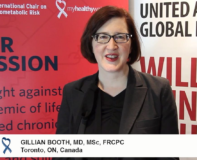
What are the low-hanging fruits to combat the epidemic of type 2 diabetes?
Expert opinion by Gillian Booth, MD, MSc, FRCPC, Associate Professor, Department of Medicine, University of Toronto; Adjunct Scientist, Institute for Clinical Evaluative Sciences, Toronto, ON, Canada See More
Why is cardiorespiratory fitness still not assessed in clinical practice?
Expert opinion by Steven N. Blair, P.E.D., FACSM, Professor (retired), Departments of Exercise Science and Epidemiology and Biostatistics, Arnold School of Public Health, University of South Carolina, Columbia, SC, USA See More
As a clinician and a scientist, could you comment on the successes and surprises of atherosclerosis research?
Expert opinion by Peter Libby, MD, Mallinckrodt Professor of Medicine, Harvard Medical School, Boston, MA, USA See More
As a scientist and a clinician, what tools would you like to have to better assess the cancer prognosis in your patients?
Expert opinion by Vincent Fradet, MD, PhD, Associate Professor, Faculty of Medicine; Research Scientist, Cancer Research Centre, CHU de Québec, Université Laval, Québec, QC, Canada See More
Could you discuss the evolution of the ICCR messages?
Expert opinion by Jean-Pierre Després, PhD, FAHA, FIAS, Scientific Director, ICCR, Professor, Division of Kinesiology, Université Laval, Centre de recherche de l’IUCPQ, Québec, QC, Canada See More
What are the main results of the ICCR global sugar-sweetened beverage sale barometer?
Expert opinion by Benoit Arsenault, PhD, Professor, Faculty of Medicine, Université Laval, Centre de recherche de l’IUCPQ, Québec, QC, Canada See More
Editorial: 2018 Annual Conference of Chinese Medical Association
The ICCR held its third collaborative activity with the Chinese Medical Association during the 2018 International Forum on Continuing Education for Chronic Diseases Management, which took place in October 2018. On this occasion, Professor Qiang Zeng, Director of the Health Management Association, gave us the opportunity to hold a three-hour session, prior to the opening … Continued See More
Any advice on the type of food to eat?
Expert opinion by Benoît Lamarche, PhD, FAHA, Professor, Institute of Nutraceuticals and Functional Foods, Université Laval, Québec, QC, Canada See More
How can visceral obesity affect cognitive function?
Expert opinion by Hannah Gardener, ScD, Associate Scientist, Department of Neurology, University of Miami Miller School of Medicine, Miami, FL, USA See More
Could you describe the main findings of the Dallas Heart Study regarding the link between visceral obesity and various clinical outcomes?
Expert opinion by Ian J. Neeland, MD, Assistant Professor, Department of Internal Medicine, University of Texas Southwestern Medical Center, Dallas, TX, USA See More
What is the situation regarding the prevalence of visceral obesity in South Korea? Did you see an improvement?
Expert opinion by Soo Lim, MD, MPH, PhD, Associate Professor, Division of Endocrinology and Metabolism, Seoul National University Bundang Hospital, Seongnam, South Korea See More
Is there a link between visceral obesity and atrial fibrillation?
Expert opinion by Stéphane N. Hatem, MD, PhD, Professor, Heart Institute of Pitié-Salpétrière Hospital; Director, INSERM/University Pierre-Marie-Curie Research Laboratory (UMRS 1166), Paris, France See More
Could you describe the history of the NEO Study?
Expert opinion by Renée de Mutsert, PhD, Assistant Professor, Department of Clinical Epidemiology, Leiden University Medical Center, Leiden, The Netherlands See More
What is the most important study in your current research portfolio?
Expert opinion by Nicholas J. Wareham, MB, PhD, Professor and Director, MRC Epidemiology Unit, University of Cambridge, Cambridge, UK See More
What are the key population drivers of hypertension?
Expert opinion by Saverio Stranges, MD, PhD, FAHA, Professor and Chair, Department of Epidemiology and Biostatistics, Schulich School of Medicine & Dentistry, Western University, London, ON, Canada See More
Editorial: The visceral obesity phenotype: Deeply scrutinized at the IAS/ICCR satellite symposium
Co-chaired by Drs. Yuji Matsuzawa and Jean-Pierre Després, the satellite symposium held in Toronto on June 13, 2018, and entitled “Visceral adiposity and related hypertriglyceridemia: From etiology to clinical management” gathered several international delegates including ten speakers. The morning session was dedicated to the pathophysiology of functional/dysfunctional adipose tissue as well as to the review … Continued See More
Who were the most influential mentors in your career?
Expert opinion by Marja-Riitta Taskinen, MD, PhD, Emerita Professor of Medicine, Research Programs Unit, Diabetes and Obesity, University of Helsinki, Helsinki University Hospital, Helsinki, Finland See More
Could you comment on the work of your mentor Per Bjorntorp and on the history of body fat distribution?
Expert opinion by Jaap Seidell, PhD, Professor, Department of Health Sciences, Amsterdam Public Health Research Institute, and the EMGO Institute for Health and Care Research, VU University Amsterdam, Amsterdam, The Netherlands See More
Could you comment on the AHA statement on cardiorespiratory fitness as a vital sign?
Expert opinion by Robert Ross, PhD, Professor, School of Kinesiology and Health Studies, Department of Medicine, Division of Endocrinology and Metabolism, Queen’s University, Kingston, ON, Canada See More
What are the key findings of the PREDIMED study regarding the impact of the Mediterranean diet on various clinical outcomes beyond cardiovascular outcomes?
Expert opinion by Emilio Ros, MD, PhD, Director, Lipid Clinic; Senior Consultant, Endocrinology and Nutrition Service, Hospital Clínic, Barcelona, Spain See More
Why is physical inactivity such an important risk factor for cardiovascular disease?
Expert opinion by I-Min Lee, MD, MPH, ScD, Professor, Brigham and Women’s Hospital, Harvard Medical School, T.H. Chan School of Public Health, Boston, MA, USA See More
What is the most important risk factor for type 2 diabetes?
Expert opinion by Gillian Booth, MD, MSc, FRCPC, Associate Professor, Department of Medicine, University of Toronto; Adjunct Scientist, Institute for Clinical Evaluative Sciences, Toronto, ON, Canada See More
How would you compare poor cardiorespiratory fitness to the well-established traditional risk factors for CVD?
Expert opinion by Steven N. Blair, P.E.D., FACSM, Professor (retired), Departments of Exercise Science and Epidemiology and Biostatistics, Arnold School of Public Health, University of South Carolina, Columbia, SC, USA See More
What are the most important discoveries in the field of lipidology over the last 50 years?
Expert opinion by Peter Libby, MD, Mallinckrodt Professor of Medicine, Harvard Medical School, Boston, MA, USA See More
What are the known mechanisms explaining the relationship between lifestyle habits and cancers?
Expert opinion by Vincent Fradet, MD, PhD, Associate Professor, Faculty of Medicine; Research Scientist, Cancer Research Centre, CHU de Québec, Université Laval, Québec, QC, Canada See More
What data do you have to analyze sales in sugary beverages?
Expert opinion by Benoit Arsenault, PhD, Professor, Faculty of Medicine, Université Laval, Centre de recherche de l’IUCPQ, Québec, QC, Canada See More
Could you talk about the deleterious impacts of intra-abdominal or visceral obesity?
Expert opinion by Jean-Pierre Després, PhD, FAHA, FIAS, Scientific Director, ICCR, Professor, Division of Kinesiology, Université Laval, Centre de recherche de l’Institut universitaire de cardiologie et de pneumologie de Québec, QC, Canada See More
Editorial: IAS/ICCR Satellite Symposium, June 13, 2018
Abdominal obesity, visceral obesity in particular, is the most dangerous form of obesity. An excess of abdominal visceral fat is associated with metabolic disorders leading to type 2 diabetes, cardiovascular disease and certain forms of cancer. Taking the opportunity of the XVIIIth International Symposium on Atherosclerosis in Toronto to be held on June 9-12, 2018, … Continued See More
Could you define nutritional quality?
Expert opinion by Benoît Lamarche, PhD, FAHA, Professor, Institute of Nutraceuticals and Functional Foods, Université Laval, Québec, QC, Canada See More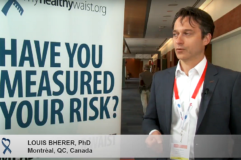
What is the role of lifestyle factors on brain health?
Expert opinion by Louis Bherer, PhD, Chair in Preventive Health Science Research and Scientific Director of the PERFORM Centre, Concordia University, Montréal, QC, Canada See More
Editorial: Marja-Riitta Taskinen, recipient of the 2017 Robert Levy Memorial Lecture
The Robert Levy Memorial Lecture was established in 2001 by the Council on Lifestyle and Cardiometabolic Health (previously the Council on Nutrition, Physical Activity and Metabolism) in recognition of Dr. Levy’s distinguished career in the field of lipidology and cardiovascular medicine. This year, Marja-Riitta Taskinen, an Emerita Professor of Medicine from the University of Helsinki … Continued See More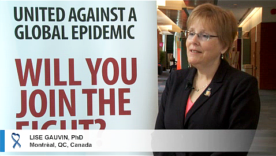
Why do you think there is still a gap between what we know about the science of obesity as a health hazard and our public health messages still referring to weight loss and healthy BMI?
Expert opinion by Lise Gauvin, PhD, Professor, Department of Social and Preventive Medicine, Université de Montréal; Associate Scientific Director for Population Health Research, CHUM Research Centre, Montréal, QC, Canada See More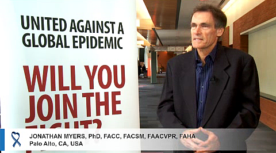
Considering the epidemic of physical inactivity, do you think that the recommended level of physical activity in the current guidelines is sufficient or optimal?
Expert opinion by Jonathan Myers, PhD, FACC, FACSM, FAACVPR, FAHA, Health Research Scientist, VA Palo Alto Health Care System; Clinical Professor of Medicine, Stanford University, Palo Alto, CA, USA See More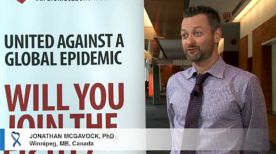
Are there specific preventive approaches working better in adolescents?
Expert opinion by Jonathan McGavock, PhD, Associate Professor, Department of Pediatrics and Child Health, Faculty of Medicine, Manitoba Institute of Child Health, University of Manitoba; CIHR Applied Public Health Chair in Resilience and Childhood Obesity, Winnipeg, MB, CA See More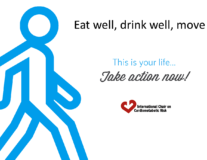
Editorial: Achieving ideal cardiovascular health: Still a long way to go!
According to the latest statistics of the American Heart Association (AHA), death rates attributable to cardiovascular diseases (CVD) have declined by 28.8% from 2003 to 2013 [1]. Over the same period, the number of CVD deaths per year has declined by 11.7%. Despite these encouraging news, CVD still accounts for 31% of all deaths in … Continued See More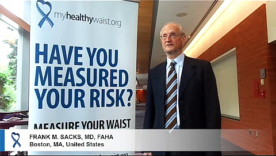
What additional pragmatic large nutritional trial would you like to conduct? What would be your priority question?
Expert opinion by Frank M. Sacks, MD, FAHA, Department of Nutrition, Harvard T. H. Chan School of Public Health, Boston, MA, United States See More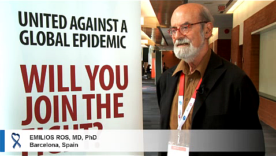
Could you elaborate on the fact that PREDIMED questioned the relevance of reducing the fat content of the diet as a primary target to reduce cardiovascular disease risk?
Expert opinion by Emilios Ros, MD, PhD, Director, Lipid Clinic; Senior Consultant, Endocrinology and Nutrition Service, Hospital Clínic, Barcelona, Spain See More
Editorial: The Annual Conference of Chinese Health Management Society
For its second collaboration with the Chinese Medical Association, the ICCR held a conference in Chongqing under the presidency of Professor Qiang Zeng, Director of the Health Management Institute. It was an opportunity for the ICCR to participate in the fight against obesity and the huge epidemic of type 2 diabetes and cardiovascular disease in … Continued See More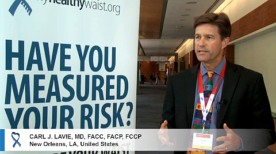
Could you describe the possibly deleterious impact of excessive amount of exercise on the heart and the cardiovascular system?
Expert opinion by Carl J. Lavie, MD, FACC, FACP, FCCP, Professor of Medicine and Medical Director, Cardiac Rehabilitation and Preventive Cardiology; Director, Exercise Testing Laboratory; and Staff Cardiologist, Echocardiographic Laboratory at the John Ochsner Heart and Vascular Institute, Ochsner Clinical School-The University of Queensland School of Medicine, New Orleans, LA, United States See More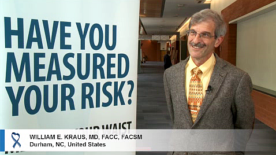
What are the key barriers to the implementation of the national physical activity plan?
Expert opinion by William E. Kraus, MD, FACC, FACSM, Director of Clinical Translation, Duke Molecular Physiology Institute, Professor, Department of Medicine, Duke University Medical Center, Durham, NC, United States See More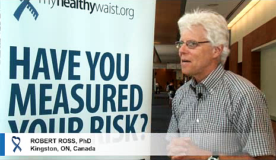
What future do you foresee for kinesiologists in the healthcare system?
Expert opinion by Robert Ross, PhD, Professor, School of Kinesiology and Health Studies, Department of Medicine, Division of Endocrinology and Metabolism, Queen’s University, Kingston, ON, Canada See More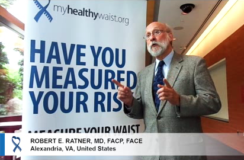
Why do you think obesity in type 2 diabetes is still defined by the BMI despite the considerable evidence that excess visceral adipose tissue, ectopic fat and dysfunctional adipose tissue are factors leading to disturbances including insulin resistance and type 2 diabetes?
Expert opinion by Robert E. Ratner, MD, FACP, FACE, Chief Scientific and Medical Officer, American Diabetes Association, Alexandria, VA, United States See More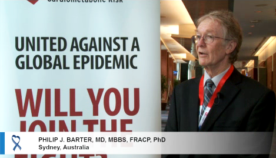
What are the remaining challenges and barriers to overcome in order to improve cardiovascular health worldwide?
Expert opinion by Philip J. Barter, MD, MBBS, FRACP, PhD, Conjoint Professor, University of New South Wales, Sydney, Australia See More
How could regular physical activity/exercise improve the cardiometabolic risk profile of adolescents?
Expert opinion by Jonathan McGavock, PhD, Associate Professor, Department of Pediatrics and Child Health, Faculty of Medicine, Manitoba Institute of Child Health, University of Manitoba; CIHR Applied Public Health Chair in Resilience and Childhood Obesity, Winnipeg, MB, CA See More
Could you explain what is the CANHEART Health Index?
Expert opinion by Gillian Booth, MD, MSc, FRCPC, Associate Professor, Department of Medicine, University of Toronto; Adjunct Scientist, Institute for Clinical Evaluative Sciences, Toronto, ON, Canada See More
Could you briefly describe the PREDIMED-PLUS study currently underway?
Expert opinion by Emilios Ros, MD, PhD, Director, Lipid Clinic; Senior Consultant, Endocrinology and Nutrition Service, Hospital Clínic, Barcelona, Spain See More
In your epidemiological studies, which key nutritional factors have you identified in the risk of cardiovascular disease and type 2 diabetes?
Expert opinion by Frank B. Hu, MD, PhD, Departments of Nutrition and Epidemiology, Harvard School of Public Health, Boston, MA, United States See More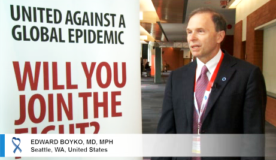
What are the questions currently examined in the Japanese American cohort?
Expert opinion by Edward Boyko, MD, MPH, Professor of Medicine, Adjunct Professor of Epidemiology, University of Washington, Seattle, WA, United States See More
Editorial: The 6th ICCR Congress on Chronic Societal Cardiometabolic Diseases: scientists mobilized to develop “lifestyle medicine” solutions and population-based approaches
The Organizing Committee of the 6th ICCR Congress would like to thank all the speakers and participants who attended the meeting held in Québec City on May 15-17, 2017. The high-quality scientific program involved several international leaders and covered the most recent advances in the field of chronic societal cardiometabolic diseases, from the pathophysiology of … Continued See More
Based on your own scientific data and experience as an academic cardiologist, could you comment on the impact of regular physical activity/exercise in the various clinical populations that you and your group manage?
Expert opinion by William E. Kraus, MD, FACC, FACSM, Director of Clinical Translation, Duke Molecular Physiology Institute, Professor, Department of Medicine, Duke University Medical Center, Durham, NC, United States See More
What are the key ingredients for success to implement lifestyle modification programs in primary care?
Expert opinion by Robert Ross, PhD, Professor, School of Kinesiology and Health Studies, Department of Medicine, Division of Endocrinology and Metabolism, Queen’s University, Kingston, ON, Canada See More
Will we eventually bridge the gap between the individual management of patients with type 2 diabetes and public health approaches?
Expert opinion by Robert E. Ratner, MD, FACP, FACE, Chief Scientific and Medical Officer, American Diabetes Association, Alexandria, VA, United States See More
What are the most exciting developments in lipidology?
Expert opinion by Philip J. Barter, MD, MBBS, FRACP, PhD, Conjoint Professor, University of New South Wales, Sydney, Australia See More
Editorial: Abdominal obesity: a causal risk factor for cardiometabolic diseases
The strong association between abdominal obesity and the risk of type 2 diabetes (T2D) and coronary heart disease (CHD) has been validated by several large-scale epidemiological prospective studies over the past 40 years. Many of these studies have also shown that abdominal obesity predicts the risk of T2D and CHD regardless of body weight and … Continued See More
What are the key ingredients to achieve changes in sedentary behaviours at the societal level?
Expert opinion by Lise Gauvin, PhD, Professor, Department of Social and Preventive Medicine, Université de Montréal; Associate Scientific Director for Population Health Research, CHUM Research Centre, Montréal, QC, Canada See More
Why is poor cardiorespiratory fitness such a powerful predictor of various clinical outcomes?
Expert opinion by Jonathan Myers, PhD, FACC, FACSM, FAACVPR, FAHA, Health Research Scientist, VA Palo Alto Health Care System; Clinical Professor of Medicine, Stanford University, Palo Alto, CA, USA See More
Are excess visceral adipose tissue, liver fat, ectopic fat deposition also observed even in adolescents?
Expert opinion by Jonathan McGavock, PhD, Associate Professor, Department of Pediatrics and Child Health, Faculty of Medicine, Manitoba Institute of Child Health, University of Manitoba; CIHR Applied Public Health Chair in Resilience and Childhood Obesity, Winnipeg, MB, CA See More
Is there a link between the socioeconomic status and the development of type 2 diabetes?
Expert opinion by Gillian Booth, MD, MSc, FRCPC, Associate Professor, Department of Medicine, University of Toronto; Adjunct Scientist, Institute for Clinical Evaluative Sciences, Toronto, ON, Canada See More
What defines a healthy diet?
Expert opinion by Frank M. Sacks, MD, FAHA, Department of Nutrition, Harvard T. H. Chan School of Public Health, Boston, MA, United States See More
What are the key mechanisms explaining the effects of food products provided to patients on the various clinical outcomes reported in PREDIMED?
Expert opinion by Emilios Ros, MD, PhD, Director, Lipid Clinic; Senior Consultant, Endocrinology and Nutrition Service, Hospital Clínic, Barcelona, Spain See More
Are there any findings specific to the Japanese Americans compared to other ethnic groups?
Expert opinion by Edward Boyko, MD, MPH, Professor of Medicine, Adjunct Professor of Epidemiology, University of Washington, Seattle, WA, United States See More
Could you highlight the key systems improved by regular physical activity/exercise beyond weight loss?
Expert opinion by Carl J. Lavie, MD, FACC, FACP, FCCP, Professor of Medicine and Medical Director, Cardiac Rehabilitation and Preventive Cardiology; Director, Exercise Testing Laboratory; and Staff Cardiologist, Echocardiographic Laboratory at the John Ochsner Heart and Vascular Institute, Ochsner Clinical School-The University of Queensland School of Medicine, New Orleans, LA, United States See More
Editorial: 2016 International conference on weight management, lifestyle, and cardiometabolic disease
The International Chair on Cardiometabolic Risk (ICCR) and the Chinese Medical Association co-organized the first Chinese International Congress on Weight Management, Lifestyle, and Cardiometabolic Disease. At the opening of the congress, Mr. Jean-Claude Coubard, Executive Director of the ICCR, described the structure, composition and objectives of the Chair. Expert members of the Chair and Chinese … Continued See More
Why do you think cardiorespiratory fitness is not assessed as a vital sign in clinical practice?
Expert opinion by William E. Kraus, MD, FACC, FACSM, Director of Clinical Translation, Duke Molecular Physiology Institute, Professor, Department of Medicine, Duke University Medical Center, Durham, NC, United States See More
Could you elaborate on the need to go beyond body weight loss to evaluate the response of viscerally obese subjects to exercise training?
Expert opinion by Robert Ross, PhD, Professor, School of Kinesiology and Health Studies, Department of Medicine, Division of Endocrinology and Metabolism, Queen’s University, Kingston, ON, Canada See More
Is there sufficient recognition by clinicians managing patients with type 2 diabetes that their patients should eat better and move more?
Expert opinion by Robert E. Ratner, MD, FACP, FACE, Chief Scientific and Medical Officer, American Diabetes Association, Alexandria, VA, United States See More
What key progresses in cardiovascular medicine were made over the last 50 years?
Expert opinion by Philip J. Barter, MD, MBBS, FRACP, PhD, Conjoint Professor, University of New South Wales, Sydney, Australia See More
Editorial: ICCR/EHLA UK in partnership with The Sugar Reduction Summit
On 22 September 2016, the International Chair on Cardiometabolic Risk (ICCR) and the European Healthy Lifestyle Alliance (EHLA) UK partnered with The Sugar Reduction Summit to deliver a one-day conference for public health professionals, policymakers, industry representatives, academics, and health and wellness communities. The day explored the impact of both legislative and voluntary action to … Continued See More
What are the key risk factors for impaired cognitive functions and dementia?
Expert opinion by Louis Bherer, PhD, Chair in Preventive Health Science Research and Scientific Director of the PERFORM Centre, Concordia University, Montréal, QC, Canada See More
Why don’t we have data on measured level of inactivity/activity in the population of the province of Quebec yet?
Expert opinion by Lise Gauvin, PhD, Professor, Department of Social and Preventive Medicine, Université de Montréal; Associate Scientific Director for Population Health Research, CHUM Research Centre, Montréal, QC, Canada See More
What are the key research activities of your research group regarding the obesity epidemic in children and adolescents?
Expert opinion by Jonathan McGavock, PhD, Associate Professor, Department of Pediatrics and Child Health, Faculty of Medicine, Manitoba Institute of Child Health, University of Manitoba; CIHR Applied Public Health Chair in Resilience and Childhood Obesity, Winnipeg, MB, CA See More
What are the low hanging fruits in terms of ecosystem/environmental targets to improve cardiovascular health?
Expert opinion by Gillian Booth, MD, MSc, FRCPC, Associate Professor, Department of Medicine, University of Toronto; Adjunct Scientist, Institute for Clinical Evaluative Sciences, Toronto, ON, Canada See More
How misleading has been the low fat diet message regarding prevention of cardiovascular disease?
Expert opinion by Frank M. Sacks, MD, FAHA, Department of Nutrition, Harvard T. H. Chan School of Public Health, Boston, MA, United States See More
Could you summarize the beneficial impact of olive oil and nuts on numerous clinically relevant outcomes?
Expert opinion by Emilios Ros, MD, PhD, Director, Lipid Clinic; Senior Consultant, Endocrinology and Nutrition Service, Hospital Clínic, Barcelona, Spain See More
What key findings relating excess visceral fat to various cardiometabolic outcomes were reported from the Japanese American cohort?
Expert opinion by Edward Boyko, MD, MPH, Professor of Medicine, Adjunct Professor of Epidemiology, University of Washington, Seattle, WA, United States See More
Could you comment on the impact of physical inactivity on public health in the U.S. and worldwide?
Expert opinion by William E. Kraus, MD, FACC, FACSM, Director of Clinical Translation, Duke Molecular Physiology Institute, Professor, Department of Medicine, Duke University Medical Center, Durham, NC, United States See More
What are the key findings relevant to the rich literature on body fat distribution published over the last 30 years?
Expert opinion by Robert Ross, PhD, Professor, School of Kinesiology and Health Studies, Department of Medicine, Division of Endocrinology and Metabolism, Queen’s University, Kingston, ON, Canada See More
Editorial: The International Chair on Cardiometabolic Risk Global Sugar-Sweetened Beverage Sale Barometer
The epidemics of obesity and type 2 diabetes are affecting most if not all developed countries around the world. An analysis published in The Lancet showed that the number of patients with type 2 diabetes almost quadrupled since 1980. While the percentage of overweight or obese people is highest in North America and Europe, obesity … Continued See More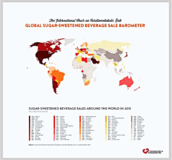
Slide Library: Global Sugar-Sweetened Beverage Sale Barometer
The European Healthy Lifestyle Alliance (EHLA) and Benoit Arsenault, PhD, Professor, Faculty of Medicine, Université Laval, Centre de recherche de l’IUCPQ, Québec, QC, Canada See More
In your opinion, what are the critical issues regarding the optimal clinical management of patients with type 2 diabetes in 2015?
Expert opinion by Robert E. Ratner, MD, FACP, FACE, Chief Scientific and Medical Officer, American Diabetes Association, Alexandria, VA, United States See More
Why is it that so few public health approaches promoting physical activity have assessed the impact of their intervention?
Expert opinion by Lise Gauvin, PhD, Professor, Department of Social and Preventive Medicine, Université de Montréal; Associate Scientific Director for Population Health Research, CHUM Research Centre, Montréal, QC, Canada See More
Why do you think fitness is still not considered as an important vital sign in clinical practice?
Expert opinion by Jonathan Myers, PhD, FACC, FACSM, FAACVPR, FAHA, Health Research Scientist, VA Palo Alto Health Care System; Clinical Professor of Medicine, Stanford University, Palo Alto, CA, USA See More
Could you describe the large research group that you have federated in Winnipeg and what are its key objectives?
Expert opinion by Jonathan McGavock, PhD, Associate Professor, Department of Pediatrics and Child Health, Faculty of Medicine, Manitoba Institute of Child Health, University of Manitoba; CIHR Applied Public Health Chair in Resilience and Childhood Obesity, Winnipeg, MB, CA See More
What key environmental factors have been shown to favour healthy behaviours?
Expert opinion by Gillian Booth, MD, MSc, FRCPC, Associate Professor, Department of Medicine, University of Toronto; Adjunct Scientist, Institute for Clinical Evaluative Sciences, Toronto, ON, Canada See More
You have had a distinguished career as a clinical scientist in the field of human nutrition. How much progress have we made in our understanding of the key factors in our diet that have an impact on the risk of cardiovascular disease?
Expert opinion by Frank M. Sacks, MD, FAHA, Department of Nutrition, Harvard T. H. Chan School of Public Health, Boston, MA, United States See More
The PREDIMED Trial was a game changer in clinical nutrition. How did you manage to conduct such a remarkable trial in Spain?
Expert opinion by Emilios Ros, MD, PhD, Director, Lipid Clinic; Senior Consultant, Endocrinology and Nutrition Service, Hospital Clínic, Barcelona, Spain See More
Could you explain the history of the Japanese American cohort and how it was developed?
Expert opinion by Edward Boyko, MD, MPH, Professor of Medicine, Adjunct Professor of Epidemiology, University of Washington, Seattle, WA, United States See More
Could you summarize the issues/controversies regarding obesity that you addressed in your book?
Expert opinion by Carl J. Lavie, MD, FACC, FACP, FCCP, Professor of Medicine and Medical Director, Cardiac Rehabilitation and Preventive Cardiology; Director, Exercise Testing Laboratory; and Staff Cardiologist, Echocardiographic Laboratory at the John Ochsner Heart and Vascular Institute, Ochsner Clinical School-The University of Queensland School of Medicine, New Orleans, LA, United States See More
You received the 2015 Jean Vague/Per Bjorntorp award. Could you comment on the contribution of these early pioneers?
Expert opinion by Robert Ross, PhD, Professor, School of Kinesiology and Health Studies, Department of Medicine, Division of Endocrinology and Metabolism, Queen’s University, Kingston, ON, Canada See More
Editorial: The 2015 dietary guidelines for Americans: The “culture of health” will have to wait
By law, the U.S. government is required to publish a new version of its dietary guidelines every five years and they have being doing so since 1980. These guidelines never go unnoticed as they influence the advice given by doctors and other health professionals to their patients, the composition of school and other public institution … Continued See More
What evidence do we have that the brown adipose tissue could play an important role in energy balance in human?
Expert opinion by André Carpentier, MD, Department of Medicine, Centre de recherche du Centre hospitalier universitaire de Sherbrooke, Université de Sherbrooke, Québec, Canada See More
Can you comment on the relationship between the overconsumption of sugar-sweetened beverages and chronic diseases?
Expert opinion by Jean-Pierre Després, PhD, FAHA, FIAS, Scientific Director, International Chair on Cardiometabolic Risk, Professor, Division of Kinesiology, Université Laval, Centre de recherche de l’Institut universitaire de cardiologie et de pneumologie de Québec, Québec, QC, Canada See More
Could you illustrate what is your understanding of the EHLA Europe slogan: Eat well, drink well and move?
Expert opinion by Benoit Arsenault, PhD, Professor, Faculty of Medicine, Université Laval, Centre de recherche de l’IUCPQ, Québec, QC, Canada See More
Could you briefly tell us what is the cardiometabolick risk, diabetes and obesity network that you have created in the province of Quebec in Canada?
Expert opinion by André Carpentier, MD, Department of Medicine, Centre de recherche du Centre hospitalier universitaire de Sherbrooke, Université de Sherbrooke, Québec, Canada See More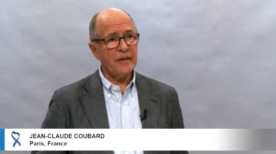
How severe is the obesity problem in Europe?
Expert opinion by Jean-Claude Coubard, Executive Director, International Chair on Cardiometabolic Risk, Centre de recherche de l’Institut universitaire de cardiologie et de pneumologie de Québec, Université Laval, Québec City, Québec, Canada See More
How important for you was the meeting organized by EHLA Europe at the European Parliament?
Expert opinion by Jean-Pierre Després, PhD, FAHA, FIAS, Scientific Director, International Chair on Cardiometabolic Risk, Professor, Division of Kinesiology, Université Laval, Centre de recherche de l’Institut universitaire de cardiologie et de pneumologie de Québec, Québec, QC, Canada See More
What are the unmet needs in the clinical management of type 2 diabetes?
Expert opinion by André Carpentier, MD, Department of Medicine, Centre de recherche du Centre hospitalier universitaire de Sherbrooke, Université de Sherbrooke, Québec, Canada See More
What is hypertriglyceridemic waist?
Expert opinion by Benoit Arsenault, PhD, Professor, Faculty of Medicine, Université Laval, Centre de recherche de l’IUCPQ, Québec, QC, Canada See More
What tools is EHLA considering to convey its messages?
Expert opinion by Jean-Claude Coubard, Executive Director, International Chair on Cardiometabolic Risk, Centre de recherche de l’Institut universitaire de cardiologie et de pneumologie de Québec, Université Laval, Québec City, Québec, Canada See More
What are the implications of your findings for the assessment and management of cardiometabolic risk in type 2 diabetes?
Expert opinion by André Carpentier, MD, Department of Medicine, Centre de recherche du Centre hospitalier universitaire de Sherbrooke, Université de Sherbrooke, Québec, Canada See More
Beyond weight control, what are the beneficial effects of regular physical activity?
Expert opinion by Benoit Arsenault, PhD, Professor, Faculty of Medicine, Université Laval, Centre de recherche de l’IUCPQ, Québec, QC, Canada See More
Could you comment on the events organized between politicians and scientists?
Expert opinion by Jean-Claude Coubard, Executive Director, International Chair on Cardiometabolic Risk, Centre de recherche de l’Institut universitaire de cardiologie et de pneumologie de Québec, Université Laval, Québec City, Québec, Canada See More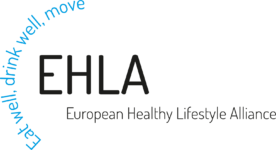
Editorial: Europe cannot afford to sit still
Obesity is one of the biggest threats to public health worldwide. Efforts to tighten the belt on “the epidemic of the 21st century” should be top priority for all concerned, the European Union (EU) included. On September 16, 2015, European Healthy Lifestyle Alliance (EHLA) members met during a Strategy meeting in Brussels to exchange on … Continued See More
Do you think that EHLA Europe has a role to play in the fight against the obesity epidemic?
Expert opinion by Jean-Pierre Després, PhD, FAHA, FIAS, Scientific Director, International Chair on Cardiometabolic Risk, Professor, Division of Kinesiology, Université Laval, Centre de recherche de l’Institut universitaire de cardiologie et de pneumologie de Québec, Québec, QC, Canada See More
Do you think that the development of diastolic dysfunction associated with impaired postprandial uptake of fatty acids is reversible?
Expert opinion by André Carpentier, MD, Department of Medicine, Centre de recherche du Centre hospitalier universitaire de Sherbrooke, Université de Sherbrooke, Québec, Canada See More
What are the challenges in the prevention of cardiovascular disease?
Expert opinion by Benoit Arsenault, PhD, Professor, Faculty of Medicine, Université Laval, Centre de recherche de l’IUCPQ, Québec, QC, Canada See More
What were EHLA’s key activities last year?
Expert opinion by Jean-Claude Coubard, Executive Director, International Chair on Cardiometabolic Risk, Centre de recherche de l’Institut universitaire de cardiologie et de pneumologie de Québec, Université Laval, Québec City, Québec, Canada See More
Could you explain the possible link between postprandial fatty acid storage in subcutaneous adipose tissue and the possible development of heart failure?
Expert opinion by André Carpentier, MD, Department of Medicine, Centre de recherche du Centre hospitalier universitaire de Sherbrooke, Université de Sherbrooke, Québec, Canada See More
Among the evolving risk factors for cardiovascular disease, could you comment on the role of physical activity or inactivity?
Expert opinion by Benoit Arsenault, PhD, Professor, Faculty of Medicine, Université Laval, Centre de recherche de l’IUCPQ, Québec, QC, Canada See More
What are the key messages promoted by EHLA?
Expert opinion by Jean-Claude Coubard, Executive Director, International Chair on Cardiometabolic Risk, Centre de recherche de l’Institut universitaire de cardiologie et de pneumologie de Québec, Université Laval, Québec City, Québec, Canada See More
Is it still relevant to talk about waist circumference measurement?
Expert opinion by Jean-Pierre Després, PhD, FAHA, FIAS, Scientific Director, International Chair on Cardiometabolic Risk, Professor, Division of Kinesiology, Université Laval, Centre de recherche de l’Institut universitaire de cardiologie et de pneumologie de Québec, Québec, QC, Canada See More
Why is the ability of subcutaneous adipose tissue to clear and store postprandial fatty acids so important?
Expert opinion by André Carpentier, MD, Department of Medicine, Centre de recherche du Centre hospitalier universitaire de Sherbrooke, Université de Sherbrooke, Québec, Canada See More
Could you comment on the evolution of cardiovascular disease risk factors over the last 40 years?
Expert opinion by Benoit Arsenault, PhD, Professor, Faculty of Medicine, Université Laval, Centre de recherche de l’IUCPQ, Québec, QC, Canada See More
What is the European Healthy Lifestyle Alliance?
Expert opinion by Jean-Claude Coubard, Executive Director, International Chair on Cardiometabolic Risk, Centre de recherche de l’Institut universitaire de cardiologie et de pneumologie de Québec, Université Laval, Québec City, Québec, Canada See More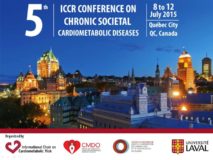
Editorial: Highlights of the 5th ICCR Congress on Chronic Societal Cardiometabolic Diseases
The Organising Committee of the 5th ICCR Congress would like to thank all participants for taking part in the meeting held in Québec City on July 8-12, 2015. During the conference, several hundred participants including specialists and general practitioners, researchers, residents, graduate students, nutritionists, kinesiologists and other healthcare professionals reviewed all aspects related to the … Continued See More
Could you explain how PET and CT technologies have allowed you to better understand postprandial energy partitioning?
Expert opinion by André Carpentier, MD, Department of Medicine, Centre de recherche du Centre hospitalier universitaire de Sherbrooke, Université de Sherbrooke, Québec, Canada See More
Editorial: An international multidisciplinary forum putting healthy lifestyle habits at the centre of prevention and clinical management of chronic societal diseases
Internationally renowned speakers will present their most recent scientific data on physical activity, exercise, nutrition and health with a strong focus on prevention at the 5th ICCR Congress on Chronic Societal Cardiometabolic Diseases. The objectives of the congress are: To better understand the pathophysiology of cardiometabolic diseases. To review large cardiometabolic imaging studies showing links … Continued See More
Could you elaborate on the notion that the exercise-trained skeletal muscle could act as a metabolic buffer?
Expert opinion by Fredrik Karpe, PhD, FRCP, Professor, Oxford Centre for Diabetes, Endocrinology and Metabolism, University of Oxford, Oxford, UK See More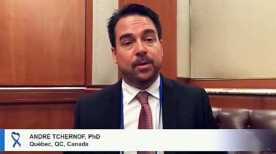
What does increased visceral adiposity reflect?
Expert opinion by André Tchernof, PhD, Department of Nutrition, Université Laval, Endocrinology and Genomics axis, Laval University Medical Centre, Québec, QC, Canada See More
How does exercise affect circulating triglyceride levels?
Expert opinion by Fredrik Karpe, PhD, FRCP, Professor, Oxford Centre for Diabetes, Endocrinology and Metabolism, University of Oxford, Oxford, UK See More
Webcast: Ectopic fat and cardiometabolic health: an update
This video presents a discussion on ectopic fat depots by three experts in this area, Dr. Ulf Smith from Sweden, Dr. Marja-Riitta Taskinen from Finland and Dr. Michael Jensen from United States. Dr. Smith introduces the notion of ectopic fat by raising the issue that BMI is not the best measurement to assess individual risk … Continued See More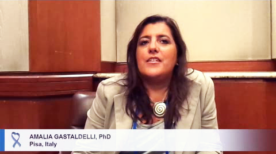
What is the role of subcutaneous adipose tissue in terms of quality and expandability in cardiometabolic diseases?
Expert opinion by Amalia Gastaldelli, PhD, Research Director, Cardiometabolic Risk Laboratory, Institute of Clinical Physiology of CNR, Pisa, Italy See More
How do you see the future in Asia in terms of clinical practice and public health relevant to management/prevention of diabetes?
Expert opinion by Juliana C N Chan, MBChB, MD, FRCP Professor of Medicine & Therapeutics, Director, Hong Kong Institute of Diabetes and Obesity, The Chinese University of Hong Kong, Hong Kong, China See More
Does the quality of subcutaneous adipose tissue have implications regarding the way we assess and manage obesity?
Expert opinion by Fredrik Karpe, PhD, FRCP, Professor, Oxford Centre for Diabetes, Endocrinology and Metabolism, University of Oxford, Oxford, UK See More
Could you comment on the adipogenic potential of subcutaneous adipose tissue as it relates to health?
Expert opinion by André Tchernof, PhD, Department of Nutrition, Université Laval, Endocrinology and Genomics axis, Laval University Medical Centre, Québec, QC, Canada See More
What are the treatment modalities that can reduce ectopic fat?
Expert opinion by Amalia Gastaldelli, PhD, Research Director, Cardiometabolic Risk Laboratory, Institute of Clinical Physiology of CNR, Pisa, Italy See More
Could you comment on the phenotypic heterogeneity of diabetes in Asia?
Expert opinion by Juliana C N Chan, MBChB, MD, FRCP Professor of Medicine & Therapeutics, Director, Hong Kong Institute of Diabetes and Obesity, The Chinese University of Hong Kong, Hong Kong, China See More
Could you elaborate on how you see the role of subcutaneous adipose tissue capacity for hyperplasia in cardiometabolic health?
Expert opinion by Fredrik Karpe, PhD, FRCP, Professor, Oxford Centre for Diabetes, Endocrinology and Metabolism, University of Oxford, Oxford, UK See More
What is the specific role played by epi/pericardial adipose tissue in coronary artery disease?
Expert opinion by Amalia Gastaldelli, PhD, Research Director, Cardiometabolic Risk Laboratory, Institute of Clinical Physiology of CNR, Pisa, Italy See More
Are the cardiovascular outcomes of diabetes in Asians similar to Caucasians?
Expert opinion by Juliana C N Chan, MBChB, MD, FRCP Professor of Medicine & Therapeutics, Director, Hong Kong Institute of Diabetes and Obesity, The Chinese University of Hong Kong, Hong Kong, China See More
Why downregulation of genes involved in metabolism is observed in obese patients?
Expert opinion by Fredrik Karpe, PhD, FRCP, Professor, Oxford Centre for Diabetes, Endocrinology and Metabolism, University of Oxford, Oxford, UK See More
Editorial: Welcome to the 5th edition of the ICCR Congress now named ICCR Congress on Chronic Societal Cardiometabolic Diseases
Initially named the International Congress on Abdominal Obesity, the ICCR conference has rapidly become the international platform to discuss novel approaches and share scientific and clinical data to benefit healthcare professionals, clinicians and scientists interested by the etiology and the management/prevention of abdominal obesity. As abdominal obesity is a central condition associated with the development … Continued See More
What is new regarding the role of abdominal fat in driving cardiometabolic risk?
Expert opinion by André Tchernof, PhD, Department of Nutrition, Université Laval, Endocrinology and Genomics axis, Laval University Medical Centre, Québec, QC, Canada See More
Do you think that the relative importance of the ectopic fat depot may depend on the clinical outcome?
Expert opinion by Amalia Gastaldelli, PhD, Research Director, Cardiometabolic Risk Laboratory, Institute of Clinical Physiology of CNR, Pisa, Italy See More
Do obese patients have an appropriate release of free fatty acids relative to their fat mass?
Expert opinion by Fredrik Karpe, PhD, FRCP, Professor, Oxford Centre for Diabetes, Endocrinology and Metabolism, University of Oxford, Oxford, UK See More
Are some countries in Asia more afflicted by the diabetes epidemic than others and why?
Expert opinion by Juliana C N Chan, MBChB, MD, FRCP Professor of Medicine & Therapeutics, Director, Hong Kong Institute of Diabetes and Obesity, The Chinese University of Hong Kong, Hong Kong, China See More
Do obese patients have an appropriate release of free fatty acids relative to their lean body mass?
Expert opinion by Fredrik Karpe, PhD, FRCP, Professor, Oxford Centre for Diabetes, Endocrinology and Metabolism, University of Oxford, Oxford, UK See More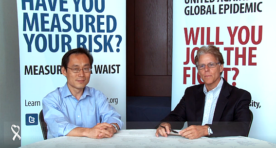
Webcast: Lifestyle factors associated with abdominal obesity and cardiometabolic health
Determinants of abdominal obesity, nutrition and cardiometabolic health are discussed in this video by Drs. Robert Ross and Frank Hu in which the concept of nutritional quality is also addressed. For instance, Dr. Hu underlines the deleterious impact of an overconsumption of sugar-sweetened beverages on body weight, abdominal obesity and type 2 diabetes. He also … Continued See More
Could you explain what are the key ectopic fat depots and why?
Expert opinion by Amalia Gastaldelli, PhD, Research Director, Cardiometabolic Risk Laboratory, Institute of Clinical Physiology of CNR, Pisa, Italy See More
What is the global picture regarding diabetes in China? How bad is the problem?
Expert opinion by Juliana C N Chan, MBChB, MD, FRCP Professor of Medicine & Therapeutics, Director, Hong Kong Institute of Diabetes and Obesity, The Chinese University of Hong Kong, Hong Kong, China See More
Could you comment on the “dogma” that obese subjects have increased free fatty acid levels?
Expert opinion by Fredrik Karpe, PhD, FRCP, Professor, Oxford Centre for Diabetes, Endocrinology and Metabolism, University of Oxford, Oxford, UK See More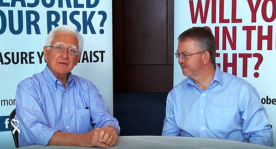
Webcast: Prevention of type 2 diabetes: from individual interventions to population-based approaches
Drs. Edward Horton and Nick Wareham talk about issues related to lifestyle interventions, prevention of diabetes and reduction of cardiovascular risk factors. They also discuss the positive and long-term effects of lifestyle modification focusing on weight reduction, healthy diet and increased physical activity to prevent or delay the development of diabetes in high-risk individuals. Dr. … Continued See More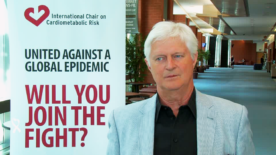
Could adipose tissue inflammation eventually be considered as a relevant therapeutic target?
Expert opinion by Ulf Smith, MD, PhD, Professor of Internal Medicine, The Lundberg Laboratory for Diabetes Research, Center of Excellence for Cardiovascular and Metabolic Research, Sahlgrenska Academy, Göteborg University, Göteborg, Sweden. See More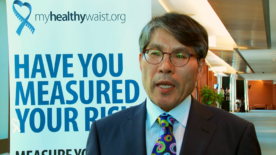
Could you comment on the link between statin use and the risk of developing type 2 diabetes?
Expert opinion by Kwang Kong Koh, MD, PhD, FACC, FAHA, Professor, Vascular Medicine and Atherosclerosis Unit Cardiology, Gachon University Gil Medical Center, Incheon, South Korea See More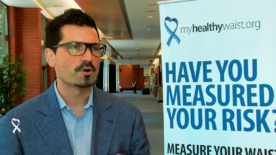
What is in your opinion the future of cardiovascular disease prevention?
Expert opinion by Eric Larose, DVM, MD, Adjunct Professor, Multidisciplinary Department of Cardiology, Institut universitaire de cardiologie et de pneumologie de Québec, Faculty of Medicine, Université Laval, Québec, QC, Canada See More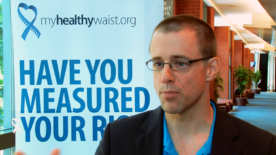
Do you think that nutraceutical products have a real impact on cardiovascular health?
Expert opinion by Benoît Lamarche, PhD, Professor, Institute of Nutraceuticals and Functional Foods, Université Laval, Québec, QC, Canada See More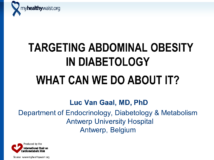
Targeting abdominal obesity in diabetology: What can we do about it?
By Luc Van Gaal, MD, PhD, Professor of Medicine, Antwerp University Hospital, Faculty of Medicine, Department of Diabetology, Metabolism & Clinical Nutrition, Antwerp, Belgium [54 slides] See More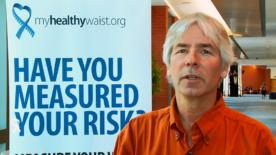
Worldwide, what are the common features of a healthy diet?
Expert opinion by Christopher Gardner, PhD, Director, Stanford Prevention Research Center, Stanford University School of Medicine, Stanford, California, LA, USA See More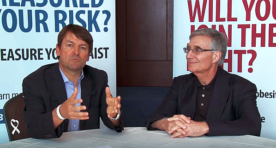
Webcast: Ideal cardiovascular health: implications for primordial prevention
Dr. Després and Dr. Libby talk about the percentage of American people who are considered in ideal cardiovascular health. Dr. Després explains the criteria that the AHA experts have identified to define ideal cardiovascular health which include three biological markers and four behavioural markers. Recent studies have shown that only 0.1% of individuals are considered … Continued See More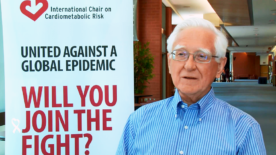
In the present world, how do you see the challenge of improving nutritional and physical activity habits in patients with type 2 diabetes managed in primary care?
Expert opinion by Edward Horton, MD, Joslin Diabetes Center, Boston, MA, USA See More
How, why and what should we do in clinical practice to implement physical activity exercise programs successfully?
Expert opinion by Robert Ross, PhD, Professor, School of Kinesiology and Health Studies, Department of Medicine, Division of Endocrinology and Metabolism, Queen’s University, Kingston, ON, Canada See More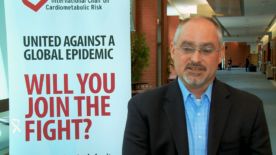
How do you see the future of optimal CVD risk assessment and management in patients with type 2 diabetes?
Expert opinion by Darren McGuire, MD, MHSC, Division of Cardiology and Department of Internal Medicine, University of Texas Southwestern Medical Center, Dallas, TX, USA See More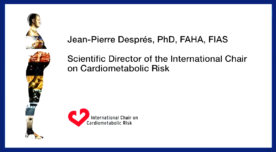
Webcast: Dr. Jean-Pierre Després and Ms. Androulla Vassiliou at the September 17, 2013 Special conference – Eat well, drink well, move… A small step for you, a big step for Europe
In this video made during the special conference organized by the International Chair on Cardiometabolic Risk entitled “Eat well, drink well and move… A small step for you, a big step for Europe”, Dr. Després discusses the need to educate the public about a dangerous form of obesity: abdominal obesity. He also emphasizes that measuring … Continued See More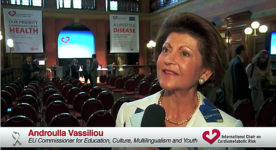
Webcast: Highlights – Eat well, drink well, move… A small step for you, a big step for Europe
Obesity is a lifestyle disease that is becoming one of the greatest public health challenges of the 21st century. Unless we make significant changes to both our diet and way of life, the prevalence of obesity will continue to increase in Europe. Three simple targets are proposed to educate and mobilize European citizens: eat well, … Continued See More
How do you see adipose tissue as a target for the management of cardiometabolic risk?
Expert opinion by Michael Jensen, MD, Division of Endocrinology and Metabolism, Department of Internal Medicine, Mayo Clinic and Foundation, Rochester, MN, USA See More
Could you elaborate on the multiple target therapies to manage high-risk patients with abdominal obesity and the metabolic syndrome?
Expert opinion by Kwang Kong Koh, MD, PhD, FACC, FAHA, Professor, Vascular Medicine and Atherosclerosis Unit Cardiology, Gachon University Gil Medical Center, Incheon, South Korea See More
Editorial: Eat well, drink well, move . . . A small step for you, a big step for Europe
On September 17, 2013, the International Chair on Cardiometabolic Risk organized a one-day special conference which brought together international experts, politicians, nongovernmental organizations (NGOs) and stakeholders. This unique event was held at the European Parliament in Brussels. Obesity is a lifestyle disease that is becoming one of the greatest public health challenges of the 21th … Continued See More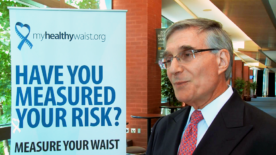
As an academic cardiologist, do you believe that abdominal obesity may eventually become a useful target of CVD risk reduction?
Expert opinion by Peter Libby, MD, Chief, Cardiovascular Medicine, Brigham and Women’s Hospital, Mallinckrodt Professor of Medicine, Harvard Medical School, Boston, USA See More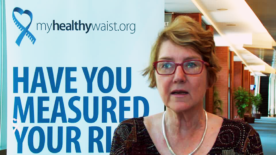
What are the key predictors of the risk of developing type 2 diabetes?
Expert opinion by Beverley Balkau, PhD, INSERM, Center for Research in Epidemiology and Population Health, Epidemiology of Diabetes, Obesity, and Chronic Kidney Disease over the Lifecourse, University Paris Sud, Unité mixte de recherche en santé, Villejuif, France See More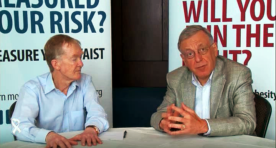
Webcast: The atherogenic dyslipidemia of abdominal obesity
The atherogenic dyslipidemia of abdominal obesity is discussed in this video with two experts in this area, Drs. Philip Barter and Ronald Krauss. Dr. Barter emphasizes that abdominal obesity is now driving a new worldwide epidemic of cardiovascular disease. He invites Dr. Krauss to discuss the lipid abnormalities frequently associated with abdominal obesity. Dr. Krauss … Continued See More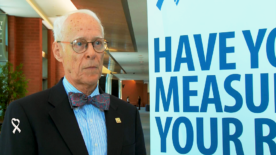
What is the evidence that fructose intake contributes to obesity, type 2 diabetes and CVD risk?
Expert opinion by George A. Bray, MD, Boyd Professor and Chief, Division of Clinical Obesity and Metabolism, Pennington Biomedical Research Center, Louisiana State University, Baton Rouge, LA, USA See More
Do you think it is possible to target the dysfunctional adipose tissue to improve cardiometabolic risk?
Expert opinion by Michael Jensen, MD, Professor of Medicine, Division of Endocrinology and Metabolism, Department of Internal Medicine, Mayo Clinic and Foundation, Rochester, MN, USA See More
Have you seen any changes in the prevalence of modifiable CVD risk factors in Korea over the last 20 years?
Expert opinion by Kwang Kong Koh, MD, PhD, FACC, FAHA, Professor, Vascular Medicine and Atherosclerosis Unit Cardiology, Gachon University Gil Medical Center, Incheon, South Korea See More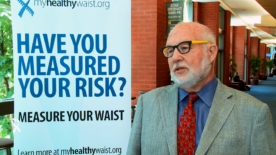
Could you summarize your own perception of Dr. Ahmed Kissebah’s scientific contribution?
Expert opinion by Richard N. Bergman, PhD, Director, Cedars-Sinai Diabetes and Obesity Research Institute, Los Angeles, CA, USA See More
In the future, do you see physical activity as a broad CVD risk management?
Expert opinion by Peter Libby, MD, Chief, Cardiovascular Medicine, Brigham and Women’s Hospital, Mallinckrodt Professor of Medicine, Harvard Medical School, Boston, USA See More
Is there risk associated with vigorous exercise?
Expert opinion by Eric Larose, DVM, MD, Adjunct Professor, Multidisciplinary Department of Cardiology, Institut universitaire de cardiologie et de pneumologie de Québec, Faculty of Medicine, Université Laval, Québec, QC, Canada See More
In your opinion, what are the main environmental barriers to eating healthy?
Expert opinion by Benoît Lamarche, PhD, Professor, Institute of Nutraceuticals and Functional Foods, Université Laval, Québec, QC, Canada See More
How would you rate abdominal obesity as a CVD risk factor compared to cholesterol, smoking and hypertension?
Expert opinion by Philip J. Barter, MBBS, FRACP, PhD, Professor and Director, the Heart Research Institute, Sydney, Australia See More
What have we learned in the extension of the Diabetes Prevention Program?
Expert opinion by Edward Horton, MD, Joslin Diabetes Center, Boston, MA, USA See More
How can regular physical activity reduce waist circumference without a reduction in body weight?
Expert opinion by Robert Ross, PhD, Professor, School of Kinesiology and Health Studies, Department of Medicine, Division of Endocrinology and Metabolism, Queen’s University, Kingston, ON, Canada See More
Which are the key features of the contemporary lifestyle promoting obesity both from energy intake and energy expenditure standpoints?
Expert opinion by George A. Bray, MD, Boyd Professor and Chief, Division of Clinical Obesity and Metabolism, Pennington Biomedical Research Center, Louisiana State University, Baton Rouge, LA, USA See More
In the current environment, do you think that it is really possible to improve eating and physical activity habits in patients with type 2 diabetes and coronary artery disease?
Expert opinion by Darren McGuire, MD, MHSC, Division of Cardiology and Department of Internal Medicine, University of Texas Southwestern Medical Center, Dallas, TX, USA See More
After 25 years of extensive studies of lipid and adipose tissue metabolism, how do you see adipose tissue?
Expert opinion by Michael Jensen, MD, Division of Endocrinology and Metabolism, Department of Internal Medicine, Mayo Clinic and Foundation, Rochester, MN, USA See More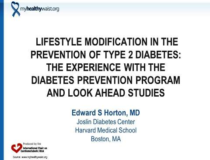
Lifestyle modification in the prevention of type 2 diabetes: The experience with the Diabetes Prevention Program and Look AHEAD studies
By Edward Horton, MD, Joslin Diabetes Center, Boston, MA, USA [60 slides] See More
Are abdominal obesity and type 2 diabetes a source of concern for your health authorities in Korea?
Expert opinion by Kwang Kong Koh, MD, PhD, FACC, FAHA, Professor, Vascular Medicine and Atherosclerosis Unit Cardiology, Gachon University Gil Medical Center, Incheon, South Korea See More
What is the primary factor associated with the inflammatory profile found among patients who are viscerally obese?
Expert opinion by Ulf Smith, MD, PhD, Professor of Internal Medicine, The Lundberg Laboratory for Diabetes Research, Center of Excellence for Cardiovascular and Metabolic Research, Sahlgrenska Academy, Göteborg University, Göteborg, Sweden. See More
What is the role of regular physical activity in primary and secondary prevention?
Expert opinion by Peter Libby, MD, Chief, Cardiovascular Medicine, Brigham and Women’s Hospital, Mallinckrodt Professor of Medicine, Harvard Medical School, Boston, USA See More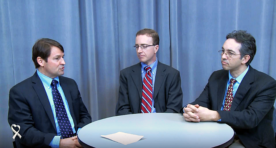
Webcast: Metabolic aspects of valvular disease
Metabolic aspects of valvular disease are discussed in this video where 2 experts in this area, Drs. Mathieu and Pibarot are interviewed by Dr. Després, the Scientific Director of the International Chair on Cardiometabolic Risk. Dr. Mathieu emphasizes the relatively high prevalence of calcific aortic valve disease in the population and especially among patients with … Continued See More
Does abdominal obesity have a role in the etiology of early atherosclerosis?
Expert opinion by Benoit Arsenault, PhD, Professor, Faculty of Medicine, Université Laval, Centre de recherche de l’IUCPQ, Québec, QC, Canada See More
Could you comment on the recent data on ruminant trans fatty acids and the CVD risk profile?
Expert opinion by Benoît Lamarche, PhD, Professor, Institute of Nutraceuticals and Functional Foods, Université Laval, Québec, QC, Canada See More
What are the key features of a healthy diet?
Expert opinion by Christopher Gardner, PhD, Director, Stanford Prevention Research Center, Stanford University School of Medicine, Stanford, California, LA, USA See More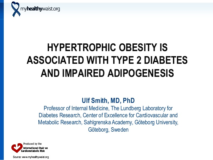
Hypertrophic obesity is associated with type 2 diabetes and impaired adipogenesis
By Ulf Smith, MD, PhD, Professor of Internal Medicine, The Lundberg Laboratory for Diabetes Research, Center of Excellence for Cardiovascular and Metabolic Research, Sahlgrenska Academy, Göteborg University, Göteborg, Sweden [24 slides] See More
Are there ethnic differences in abdominal fat accumulation?
Expert opinion by Beverley Balkau, PhD, INSERM, Center for Research in Epidemiology and Population Health, Epidemiology of Diabetes, Obesity, and Chronic Kidney Disease over the Lifecourse, University Paris Sud, Unité mixte de recherche en santé, Villejuif, France See More
Could you elaborate on the controversy of the added value of measuring waist circumference over the BMI?
Expert opinion by Robert Ross, PhD, Professor, School of Kinesiology and Health Studies, Department of Medicine, Division of Endocrinology and Metabolism, Queen’s University, Kingston, ON, Canada See More
Have there been improvements in the clinical management of obese patients?
Expert opinion by George A. Bray, MD, Boyd Professor and Chief, Division of Clinical Obesity and Metabolism, Pennington Biomedical Research Center, Louisiana State University, Baton Rouge, LA, USA See More
As an academic cardiologist, do you think abdominal obesity is an important driver of CVD risk in patients with type 2 diabetes?
Expert opinion by Darren McGuire, MD, MHSC, Division of Cardiology and Department of Internal Medicine, University of Texas Southwestern Medical Center, Dallas, TX, USA See More
Have you seen any change in the nutritional habits of the korean population over the last 20 years?
Expert opinion by Kwang Kong Koh, MD, PhD, FACC, FAHA, Professor, Vascular Medicine and Atherosclerosis Unit Cardiology, Gachon University Gil Medical Center, Incheon, South Korea See More
Webcast: Pathophysiology of adipose tissue, insulin resistance and inflammation
Determinants of abdominal obesity, nutrition and cardiometabolic health are discussed in this video by Drs. Robert Ross and Frank Hu in which the concept of nutritional quality is also addressed. For instance, Dr. Hu underlines the deleterious impact of an overconsumption of sugar-sweetened beverages on body weight, abdominal obesity and type 2 diabetes. He also … Continued See More
Are there some protective properties of adipose tissue regarding the risk of type 2 diabetes and CVD?
Expert opinion by Michael Jensen, MD, Division of Endocrinology and Metabolism, Department of Internal Medicine, Mayo Clinic and Foundation, Rochester, MN, USA See More
What are your current views regarding the specific role of visceral adiposity in the pathophysiology of insulin resistance?
Expert opinion by Richard N. Bergman, PhD, Director, Cedars-Sinai Diabetes and Obesity Research Institute, Los Angeles, CA, USA See More
Do you think abdominal obesity could also become a relevant therapeutic target for the optimal management of CVD risk in patients with type 2 diabetes?
Expert opinion by Peter Libby, MD, Chief, Cardiovascular Medicine, Brigham and Women’s Hospital, Mallinckrodt Professor of Medicine, Harvard Medical School, Boston, USA See More
Dr. Henry McGill has stated that atherosclerosis is a pediatric disease. Could you elaborate on this considering your own data?
Expert opinion by Eric Larose, DVM, MD, Adjunct Professor, Multidisciplinary Department of Cardiology, Institut universitaire de cardiologie et de pneumologie de Québec, Faculty of Medicine, Université Laval, Québec, QC, Canada See More
Editorial: Regional fat distribution, fatty acid metabolism and adipocytes
Because body fat distribution is such a powerful predictor of the metabolic consequences of obesity, we originally sought to understand whether free fatty acid (FFA) release was different in upper body obese vs. lower body obese adults. We hypothesized that increased FFA release, as opposed to decreased clearance, might be an explanation for the metabolic … Continued See More
Do you see milk as a food or a drink?
Expert opinion by Benoît Lamarche, PhD, Professor, Institute of Nutraceuticals and Functional Foods, Université Laval, Québec, QC, Canada See More
Is Korea affected by an abdominal obesity and sedentary lifestyle epidemic?
Expert opinion by Kwang Kong Koh, MD, PhD, FACC, FAHA, Professor, Vascular Medicine and Atherosclerosis Unit Cardiology, Gachon University Gil Medical Center, Incheon, South Korea See More
Do you believe that there has been too much emphasis made on the fat content of the diet compared to nutritional quality?
Expert opinion by Christopher Gardner, PhD, Director, Stanford Prevention Research Center, Stanford University School of Medicine, Stanford, California, LA, USA See More
With the current mosaic of risk factors, do you see cardiovascular disease as a societal disease?
Expert opinion by Philip J. Barter, MD, MBBS, FRACP, PhD, Professor and Director, the Heart Research Institute, Sydney, Australia See More
What have we recently learned with the Diabetes Prevention Program?
Expert opinion by Edward Horton, MD, Joslin Diabetes Center, Boston, MA, USA See More
Webcast: Lifestyle and cardiometabolic risk: an update
Drs Després, Krauss, Wareham and Ross discuss issues related to features of a healthy lifestyle relevant to the assessment and management of cardiometabolic risk. Dr. Krauss emphasizes the need to move from a technical discussion on the macronutrient composition of the diet to indices reflecting diet quality. Dr. Wareham summarizes recent developments on approaches/methods to … Continued See More
What is the situation regarding the epidemic of obesity and type 2 diabetes in France as opposed to the world?
Expert opinion by Beverley Balkau, PhD, INSERM, Center for Research in Epidemiology and Population Health, Epidemiology of Diabetes, Obesity, and Chronic Kidney Disease over the Lifecourse, University Paris Sud, Unité mixte de recherche en santé, Villejuif, France See More
How do you think we should use waist circumference? Should we use it alone and abandon the BMI or should we interpret it in the context of BMI?
Expert opinion by Robert Ross, PhD, Professor, School of Kinesiology and Health Studies, Department of Medicine, Division of Endocrinology and Metabolism, Queen’s University, Kingston, ON, Canada See More
Over the last 50 years, what are the key scientific advances made relevant to obesity?
Expert opinion by George A. Bray, MD, Boyd Professor and Chief, Division of Clinical Obesity and Metabolism, Pennington Biomedical Research Center, Louisiana State University, Baton Rouge, LA, USA See More
Which are the key drivers of CVD risk in patients with type 2 diabetes?
Expert opinion by Darren McGuire, MD, MHSC, Division of Cardiology and Department of Internal Medicine, University of Texas Southwestern Medical Center, Dallas, TX, USA See More
Could you describe which are the key features of adipose tissue metabolism which could potentially increase the risk of type 2 diabetes and CVD risk in abdominally obese patients?
Expert opinion by Michael Jensen, MD, Division of Endocrinology and Metabolism, Department of Internal Medicine, Mayo Clinic and Foundation, Rochester, MN, USA See More
What is the specific role of adipose cells vs. other cell types in adipose tissue?
Expert opinion by Ulf Smith, MD, PhD, Professor of Internal Medicine, The Lundberg Laboratory for Diabetes Research, Center of Excellence for Cardiovascular and Metabolic Research, Sahlgrenska Academy, Göteborg University, Göteborg, Sweden. See More
Webcast: Abdominal adiposity: assessment in clinical practice
In this video, Drs. Després, Ross and Poirier discuss the importance of measuring waist circumference in clinical practice. Dr. Ross emphasizes that despite available evidence on the usefulness of measuring waist circumference in addition to weight and height, there still is a need to educate primary care physicians to perform this measurement. Dr. Poirier, an … Continued See More
What are simple tools that could be used by primary care physicians or in clinical biochemistry laboratories to measure insulin sensitivity and secretion?
Expert opinion by Richard N. Bergman, PhD, Director, Cedars-Sinai Diabetes and Obesity Research Institute, Los Angeles, CA, USA See More
Editorial: Nutrition transition and chronic disease prevention in China
In the past several decades, China has been experiencing rapid economic and social development with concomitant shifts in lifestyle habits and dietary structure. These changes have led to remarkable nutritional and epidemiologic transitions [1]. In particular, traditional dietary patterns are being lost as the population adapts to more industrialized and urban food environments [2]. At … Continued See More
What are the CVD risk drivers in patients with type 2 diabetes particularly regarding the contribution of abdominal obesity and related inflammation?
Expert opinion by Peter Libby, MD, Chief, Cardiovascular Medicine, Brigham and Women’s Hospital, Mallinckrodt Professor of Medicine, Harvard Medical School, Boston, USA See More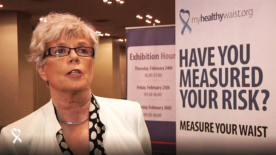
Could you tell us what has been done in Finland to promote the use of waist circumference in clinical practice as well as a public health tool?
Expert opinion by Marja-Riitta Taskinen, MD, PhD, Professor of Medicine, University of Helsinki, Department of Medicine, Biomedicum, Helsinki, Finland See More
Could you comment on the added value of abdominal obesity?
Expert opinion by Jean-Pierre Després, PhD, FAHA, FIAS, Scientific Director, International Chair on Cardiometabolic Risk, Professor, Division of Kinesiology, Université Laval, Centre de recherche de l’Institut universitaire de cardiologie et de pneumologie de Québec, Québec, QC, Canada See More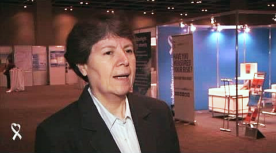
Could you summarize the key similarities and differences in total adiposity and body fat distribution among various ethnic groups studied in the Dallas Heart Study?
Expert opinion by Gloria Lena Vega, PhD, The Metabolic Unit, Lipid, and Diabetes Clinics of the Veterans Affairs North Health Care System, Dallas, TX, USA See More
Does the increased risk of obesity associated with an overconsumption of sugar-sweetened beverages explain the relationship of sugar-sweetened beverages and type 2 diabetes?
Expert opinion by Frank B. Hu, MD, PhD, Departments of Nutrition and Epidemiology, Harvard School of Public Health, Boston, MA, USA. Channing Laboratory, Department of Medicine, Brigham and Women’s Hospital and Harvard Medical School, Boston, MA, USA See More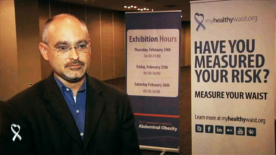
Has the field of diabetology been too glucocentric in its approach in the management of cardiovascular disease?
Expert opinion by Darren McGuire, MD, MHSC, Division of Cardiology and Department of Internal Medicine, University of Texas Southwestern Medical Center, Dallas, TX, USA See More
Obesité abdominale & diabète de type 2 – Les découvertes de l’AHA confirment le travail de l’ICCR
Opinion d’expert par Jean-Pierre Després, PhD, FAHA, FIAS, Directeur Scientifique, Chaire Internationale sur le risque cardiométabolique, Professeur, Division de Kinesiologie, Université Laval, Centre de recherche de l’Institut universitaire de cardiologie et de pneumologie de Québec, Québec, QC, Canada P See More
Journée mondiale du diabète – Le diabète de type 2: une maladie de civilisation
Opinin d’expert par Jean-Pierre Després, PhD, FAHA, FIAS, Directeur Scientifique, Chaire Internationale sur le risque cardiométabolique, Professeur, Division de Kinesiologie, Université Laval, Centre de recherche de l’Institut universitaire de cardiologie et de pneumologie de Québec, Québec, QC, Canada P See More
Risque d’obésité: Les conseils de l’ICCR
Opinion d’expert par Jean-Pierre Després, PhD, FAHA, FIAS, Directeur Scientifique, Chaire Internationale sur le risque cardiométabolique, Professeur, Division de Kinesiologie, Université Laval, Centre de recherche de l’Institut universitaire de cardiologie et de pneumologie de Québec, Québec, QC, Canada P See More
Les missions de l’ICCR
Opinion d’expert par Jean-Pierre Després, PhD, FAHA, FIAS, Directeur Scientifique, Chaire Internationale sur le risque cardiométabolique, Professeur, Division de Kinesiologie, Université Laval, Centre de recherche de l’Institut universitaire de cardiologie et de pneumologie de Québec, Québec, QC, Canada See More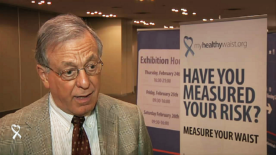
Should there be a specific diet tailored for atherogenic dyslipidemia of abdominally obese patients?
Expert opinion by Ronald Krauss, MD, Children’s Hospital Oakland Research Institute, Atherosclerosis Research, Oakland, CA, USA See More
Is it possible to mobilize liver fat and how?
Expert opinion by Marja-Riitta Taskinen, MD, PhD Professor of Medicine, University of Helsinki, Department of Medicine, Biomedicum, Helsinki, Finland See More
Are there any promising developments regarding pharmacological approaches to managing global cardiometabolic risk in patients wity type 2 diabetes?
Expert opinion by Luc Van Gaal, MD, PhD, Professor of Medicine, Antwerp University Hospital, Faculty of Medicine, Department of Diabetology, Metabolism & Clinical Nutrition, Antwerp, Belgium See More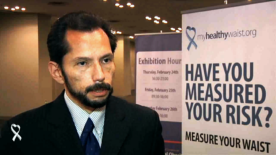
What are the preventive public health approaches for the prevention of obesity in Mexico?
Expert opinion by Carlos A. Aguilar-Salinas, MD, Department of Endocrinology and Metabolism, Instituto Nacional de Ciencias Médicas y Nutrición, Salvador Zubiran (INCMNSZ), Mexico City, Mexico See More
Is it possible to lose a substantial amount of visceral and liver fat without losing a tremendous amount of body weight?
Expert opinion by Jean-Pierre Després, PhD, FAHA, FIAS, Scientific Director, International Chair on Cardiometabolic Risk, Professor, Division of Kinesiology, Université Laval, Centre de recherche de l’Institut universitaire de cardiologie et de pneumologie de Québec, Québec, QC, Canada See More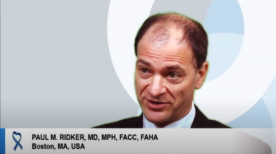
What are the key lifestyle correlates of CRP?
Expert opinion by Paul M. Ridker, MD, MPH, FACC, FAHA, Divisions of Cardiovascular Diseases and Preventive Medicine, Brigham and Women’s Hospital, Boston, MA, USA See More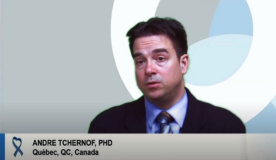
How relevant would be the measurement of waist circumference on top of BMI among women going to menopause?
Expert opinion by André Tchernof, PhD, Department of Nutrition, Université Laval, Endocrinology and Genomics axis, Laval University Medical Centre, Québec, QC, Canada See More
Are pharmacological approaches to increasing HDL cholesterol clinically relevant in reducing the risk of atherogenic dyslipidemia and abdominal obesity?
Expert opinion by Ronald Krauss, MD, Children’s Hospital Oakland Research Institute, Atherosclerosis Research, Oakland, CA, USA See More
What are the main consequences of excess liver fat accumulation on liver metabolism?
Expert opinion by Marja-Riitta Taskinen, MD, PhD, Professor of Medicine, University of Helsinki, Department of Medicine, Biomedicum, Helsinki, Finland See More
Do you think that patients with type 2 diabetes are better managed now as opposed to 25 years ago considering the ongoing epidemic of obesity and a sedentary lifestyle?
Expert opinion by Luc Van Gaal, MD, PhD, Professor of Medicine, Antwerp University Hospital, Faculty of Medicine, Department of Diabetology, Metabolism & Clinical Nutrition, Antwerp, Belgium See More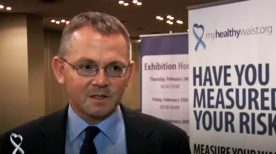
What do you think should be the priority for the management and prevention of type 2 diabetes: improved clinical models or better public health approches?
Expert opinion by Nicholas J. Wareham, MB, PhD, Director, MRC Epidemiology Unit, Institute of Metabolic Science, University of Cambridge, Cambridge, UK See More
Why should we target waist circumference reduction rather than weight loss?
Expert opinion by Jean-Pierre Després, PhD, FAHA, FIAS, Scientific Director, International Chair on Cardiometabolic Risk, Professor, Division of Kinesiology, Université Laval, Centre de recherche de l’Institut universitaire de cardiologie et de pneumologie de Québec, Québec, QC, Canada See More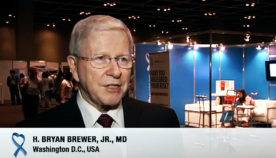
How do you foresee the pharmacological management of cardiovascular risk in the near future?
Expert opinion by H. Bryan Brewer, Jr., MD, Director, Washington Cardiovascular Associates, Senior Research Consultant, Cardiovascular Research Institute, Washington Hospital Center, Washington, D.C., USA See More
Does the effect of statins on inflammation reflect a class effect?
Expert opinion by Paul M. Ridker, MD, MPH, FACC, FAHA Divisions of Cardiovascular Diseases and Preventive Medicine, Brigham and Women’s Hospital, Boston, MA, USA See More
Could you summarize what are the respective contributions of menopause and aging to intra-abdominal (visceral) adipose tissue accumulation in women?
Expert opinion by André Tchernof, PhD, Department of Nutrition, Université Laval, Endocrinology and Genomics axis, Laval University Medical Centre, Québec, QC, Canada See More
How is an atherogenic dyslipidemia related to abdominal obesity and insulin resistance? What are the mechanisms involved?
Expert opinion by Ronald Krauss, MD, Children’s Hospital Oakland Research Institute, Atherosclerosis Research, Oakland, CA, USA See More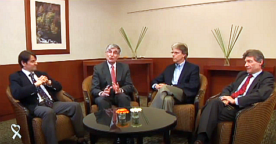
Webcast: Abdominal obesity and cardiometabolic risk: an update
Dr. Peter Libby, Dr. Jean-Pierre Després, Dr. Robert Ross and Dr. Luc Van Gaal summarize results of the INternational Study of Prediction of Intra-abdominal adiposity and its RElationships with cardioMEtabolic risk/Intra-Abdominal Adiposity study (INSPIRE ME IAA) which aimed to determine the relationship between intra-abdominal (visceral) adipose tissue and cardiometabolic risk profile. Briefly, results of the … Continued See More
What are the key drivers of excess liver fat deposition?
Expert opinion by Marja-Riitta Taskinen, MD, PhD, Professor of Medicine, University of Helsinki, Department of Medicine, Biomedicum, Helsinki, Finland See More
As opposed to 25 years ago, have you seen an evolution in cardiovascular disease risk factors in patients with type 2 diabetes?
Expert opinion by Luc Van Gaal, MD, PhD, Professor of Medicine, Antwerp University Hospital, Faculty of Medicine, Department of Diabetology, Metabolism & Clinical Nutrition, Antwerp, Belgium See More
Is it possible to counterbalance the negative effects of sugar-sweetened beverages on the risk of type 2 diabetes by simply increasing physical activity?
Expert opinion by Frank B. Hu, MD, PhD, Departments of Nutrition and Epidemiology, Harvard School of Public Health, Boston, MA, USA. Channing Laboratory, Department of Medicine, Brigham and Women?s Hospital and Harvard Medical School, Boston, MA, USA See More
Webcast: Adiposopathy and its role in insulin resistance and type 2 diabetes
Dr. Ulf Smith, Dr. Marja-Riitta Taskinen and Dr. Michael Jensen discuss issues related to body fat distribution and ectopic fat depots. Drs. Smith and Jensen describe subcutaneous adipose tissue acting as a protective reservoir as opposed to excess fat stored in the intra-abdominal (visceral) depot, in the liver, in the myocardium, or in the skeletal … Continued See More
What are the potential contributions of new imaging techniques such as CT and MRI to measure subclinical atherosclerosis?
Expert opinion by Darren McGuire, MD, MHSC, Division of Cardiology and Department of Internal Medicine, University of Texas Southwestern Medical Center, Dallas, TX, USA See More
Is there any evidence that Hispanics are characterized by an increased susceptibility to develop type 2 diabetes at a given adiposity?
Expert opinion by Carlos A. Aguilar-Salinas, MD, Department of Endocrinology and Metabolism, Instituto Nacional de Ciencias Médicas y Nutrición, Salvador Zubiran (INCMNSZ), Mexico City, Mexico See More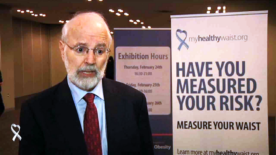
What nation leading the way in fighting the battle against sugar-sweetened beverages is your favourite case study?
Expert opinion by Barry Popkin, PhD, Department of Nutrition, School of Public Health and Medicine Department of Economics, The University of North Carolina at Chapel Hill, NC, USA See More
Could you describe what are the key features of atherogenic dyslipidemia?
Expert opinion by Ronald Krauss, MD, Children’s Hospital Oakland Research Institute, Atherosclerosis Research, Oakland, CA, USA See More
Could you comment on the link between visceral fat, liver fat and related metabolic complications?
Expert opinion by Marja-Riitta Taskinen, MD, PhD, Professor of Medicine, University of Helsinki, Department of Medicine, Biomedicum, Helsinki, Finland See More
What is the contribution of visceral adiposity and ectopic fat as factors driving cardiometabolic risk in patients with type 2 diabetes?
Expert opinion by Luc Van Gaal, MD, PhD, Professor of Medicine, Antwerp University Hospital, Faculty of Medicine, Department of Diabetology, Metabolism & Clinical Nutrition, Antwerp, Belgium See More
What are the key findings of your 3-year study on the impact of lifestyle modification in patients with visceral obesity?
Expert opinion by Jean-Pierre Després, PhD, FAHA, FIAS, Scientific Director, International Chair on Cardiometabolic Risk, Professor, Division of Kinesiology, Université Laval, Centre de recherche de l’Institut universitaire de cardiologie et de pneumologie de Québec, Québec, QC, Canada See More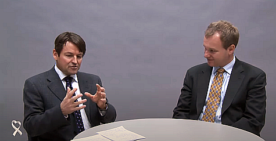
Webcast: Cardiovascular imaging, metabolic risk factors and atherogenesis: a discussion with Stephen Nicholls
In this video Dr. Jean-Pierre Després interviews Dr. Stephen Nicholls who is the Medical Director of Intravascular Ultrasound and Angiography Core Laboratories at Cleveland Clinic and Clinical Director of the Cleveland Clinic Center for Cardiovascular Diagnostics and Prevention.Dr. Nicholls has extensively studied lipids/lipoproteins involved in the atherosclerosis disease progression and recognizes that the high triglyceride-low … Continued See More
Are abdominal obesity and type 2 diabetes a concern for health authorities in Brazil?
Expert opinion by Walmir Coutinho, MD, Professor of Endocrinology, Pontifical Catholic University of Rio de Janeiro, Rio de Janeiro, Brazil See More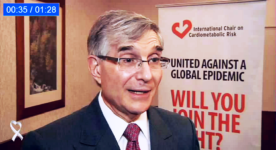
What is the role of the new iPad application developed by the Chair as a new tool for health professionnals?
Expert opinion by Peter Libby, MD, Chief, Cardiovascular Medicine, Brigham and Women’s Hospital, Mallinckrodt Professor of Medicine, Harvard Medical School, Boston, USA See More
Editorial: The importance of primordial prevention for cardiovascular health
Cardiovascular disease (CVD) mortality has decreased over the last decades, largely because of the progress that we have made in our understanding of major modifiable factors contributing to its etiology such as smoking, hypertension and high cholesterol levels. By targeting smoking cessation, cholesterol lowering by drugs and diet and by detecting and managing hypertension, we … Continued See More
Could you comment on your views regarding the relative contributions of physical activity and dietary habits in the prevention of type 2 diabetes?
Expert opinion by Nicholas J. Wareham, MB, PhD, Director, MRC Epidemiology Unit, Institute of Metabolic Science, University of Cambridge, Cambridge, UK See More
What are the key findings of the Dallas Heart Study?
Expert opinion by Gloria Lena Vega, PhD, The Metabolic Unit, Lipid, and Diabetes Clinics of the Veterans Affairs North Health Care System, Dallas, TX, USA See More
Is it possible that the subgroup of individuals with features of the metabolic syndrome may be particularly vulnerable in developing type 2 diabetes when exposed to an overconsumption of sugar-sweetened beverages?
Expert opinion by Frank B. Hu, MD, PhD, Departments of Nutrition and Epidemiology, Harvard School of Public Health, Boston, MA, USA. Channing Laboratory, Department of Medicine, Brigham and Women’s Hospital and Harvard Medical School, Boston, MA, USA See More
Do you think that the morphology of atherosclerotic plaque is distinct in patients with type 2 diabetes versus any other type of patients with cardiovascular disease and why?
Expert opinion by Darren McGuire, MD, MHSC, Division of Cardiology and Department of Internal Medicine, University of Texas Southwestern Medical Center, Dallas, TX, USA See More
Are there any data on physical activity habits in Mexico?
Expert opinion by Carlos A. Aguilar-Salinas, MD, Department of Endocrinology and Metabolism, Instituto Nacional de Ciencias Médicas y Nutrición, Salvador Zubiran (INCMNSZ), Mexico City, Mexico See More
Could you discuss and elaborate on the solutions currently considered by various countries to deal with the overconsumption of sugar-sweetened beverages?
Expert opinion by Barry Popkin, PhD, Department of Nutrition, School of Public Health and Medicine Department of Economics, The University of North Carolina at Chapel Hill, NC, USA See More
Are there ethnic differences in the relationship between total adiposity and visceral adiposity and liver fat?
Expert opinion by Jean-Pierre Després, PhD, FAHA, Scientific Director, International Chair on Cardiometabolic Risk, Professor, Division of Kinesiology, Université Laval, Centre de recherche de l’Institut universitaire de cardiologie et de pneumologie de Québec, Québec, QC, Canada See More
Is raising HDL cholesterol concentration by pharmacotherapy a relevant target among individuals with abdominal obesity and low HDL cholesterol?
Expert opinion by H. Bryan Brewer, Jr., MD, Director, Washington Cardiovascular Associates, Senior Research Consultant, Cardiovascular Research Institute, Washington Hospital Center, Washington, D.C., USA See More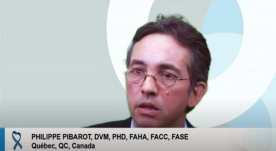
Statin therapy has overwhelming benefits to prevent cardiovascular disease. What about valvular disease?
Expert opinion by Philippe Pibarot, DVM, PhD, FAHA, FACC, FASE, Department of Medicine, Université Laval, Centre de recherche de l’Institut universitaire de cardiologie et de pneumologie de Québec, Québec, QC, Canada See More
Does imaging have a role in cardiovascular disease risk assessment beyond novel markers?
Expert opinion by Paul M. Ridker, MD, MPH, FACC, FAHA, Divisions of Cardiovascular Diseases and Preventive Medicine, Brigham and Women’s Hospital, Boston, MA, USA See More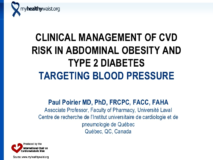
Clinical management of CVD risk in abdominal obesity and type 2 diabetes: targeting blood pressure
By Paul Poirier, MD, PhD, FRCPC, FACC, FAHA, Associate Professor, Faculty of Pharmacy, Université Laval, Québec City, Quebec, Canada [43 slides] See More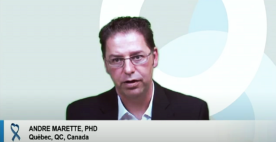
Has there been any significant advances made in our understanding of nutritional factors modulating insulin resistance and inflammation?
Expert opinion by André Marette, PhD, Department of Medicine, Université Laval, Centre de recherche de l’Institut universitaire de cardiologie et de pneumologie de Québec, Québec, QC, Canada See More
Could you describe the key regional differences in adipose tissue morphology and metabolism?
Expert opinion by André Tchernof, PhD, Department of Nutrition, Université Laval, Endocrinology and Genomics axis, Laval University Medical Centre, Québec, QC, Canada See More
How do you see the future of assessment and management of valve diseases?
Expert opinion by Patrick Mathieu, MD, Department of Surgery, Université Laval, Centre de recherche de l’Institut universitaire de cardiologie et de pneumologie de Québec, Québec, QC, Canada See More
Could you tell us more about the history and rationale of the Dallas Heart Study?
Expert opinion by Gloria Lena Vega, PhD, The Metabolic Unit, Lipid, and Diabetes Clinics of the Veterans Affairs North Health Care System, Dallas, TX, USA See More
In your epidemiological studies, which key nutritional factors have you identified in the risk of cardiovascular disease and type 2 diabetes?
Expert opinion by Frank B. Hu, MD, PhD, Departments of Nutrition and Epidemiology, Harvard School of Public Health, Boston, MA, USA. Channing Laboratory, Department of Medicine, Brigham and Women’s Hospital and Harvard Medical School, Boston, MA, USA See More
What are the key therapeutic targets to optimally reduce cardiovascular disease risk in patients with type 2 diabetes?
Expert opinion by Darren McGuire, MD, MHSC, Division of Cardiology and Department of Internal Medicine, University of Texas Southwestern Medical Center, Dallas, TX, USA See More
Could you describe the situation in Mexico regarding the evolving prevalence of abdominal obesity and metabolic syndrome?
Expert opinion by Carlos A. Aguilar-Salinas, MD, Department of Endocrinology and Metabolism, Instituto Nacional de Ciencias Médicas y Nutrición, Salvador Zubiran (INCMNSZ), Mexico City, Mexico See More
Which emergent economies are mostly afflicted by an overconsumption of sugar-sweetened beverages?
Expert opinion by Barry Popkin, PhD, Department of Nutrition, School of Public Health and Medicine Department of Economics, The University of North Carolina at Chapel Hill, NC, USA See More
How is this International Congress on Abdominal Obesity different from other international medical meetings?
Expert opinion by Walmir Coutinho, MD, Professor of Endocrinology, Pontifical Catholic University of Rio de Janeiro, Rio de Janeiro, Brazil See More
Could you comment on the evolution of the International Chair on Cardiometabolic Risk since it was launched 5 years ago?
Expert opinion by Peter Libby, MD, Chief, Cardiovascular Medicine, Brigham and Women’s Hospital, Mallinckrodt Professor of Medicine, Harvard Medical School, Boston, USA See More
What are potentially interesting new tools to better assess physical activity both in large epidemiological studies as well as in clinical pratice?
Expert opinion by Nicholas J. Wareham, MB, PhD, Director, MRC Epidemiology Unit, Institute of Metabolic Science, University of Cambridge, Cambridge, UK See More
What is the relationship of visceral adiposity and liver fat to cardiometabolic risk?
Expert opinion by Jean-Pierre Després, PhD, FAHA, FIAS, Scientific Director, International Chair on Cardiometabolic Risk, Professor, Division of Kinesiology, Université Laval, Centre de recherche de l’Institut universitaire de cardiologie et de pneumologie de Québec, Québec, QC, Canada See More
Why are HDL cholesterol levels low among individuals with abdominal obesity and with features of the metabolic syndrome?
Expert opinion by H. Bryan Brewer, Jr., MD, Director, Washington Cardiovascular Associates, Senior Research Consultant, Cardiovascular Research Institute, Washington Hospital Center, Washington, D.C., USA See More
What are the key markers involved in the relationship between features of the metabolic syndrome and aortic valve stenosis?
Expert opinion by Philippe Pibarot, DVM, PhD, FAHA, FACC, FASE, Department of Medicine, Université Laval, Centre de recherche de l’Institut universitaire de cardiologie et de pneumologie de Québec, Québec, QC, Canada See More
Is there a problem in assessing cardiovascular disease risk in women with the use of current risk algorithms?
Expert opinion by Paul M. Ridker, MD, MPH, FACC, FAHA, Divisions of Cardiovascular Diseases and Preventive Medicine, Brigham and Women’s Hospital, Boston, MA, USA See More
Editorial: Hydration and cardiometabolic health: an update from the ICCR
On numerous occasions, scientists associated with the research and educational activities of the International Chair on Cardiometabolic Risk (ICCR) have raised concerns regarding the progressive change observed in our drinking habits over the last 40 years. For instance, the consumption of milk has decreased and been progressively substituted for sugar-sweetened beverages [1]. Numerous epidemiological studies … Continued See More
Do you believe there are some key molecular targets which could possibly modulate inflammation in abdominal obesity leading to improvements in insulin sensitivity?
Expert opinion by André Marette, PhD, Department of Medicine, Université Laval, Centre de recherche de l’Institut universitaire de cardiologie et de pneumologie de Québec, Québec, QC, Canada See More
Could variation in subcutaneous adipose tissue physiology eventually have an influence on intra-abdominal (visceral) and ectopic fat deposition?
Expert opinion by André Tchernof, PhD, Department of Nutrition, Université Laval, Endocrinology and Genomics axis, Laval University Medical Centre, Québec, QC, Canada See More
Could you describe the link between abdominal obesity, features of the metabolic syndrome and aortic stenosis? What are the critical factors involved?
Expert opinion by Patrick Mathieu, MD, Department of Surgery, Université Laval, Centre de recherche de l’Institut universitaire de cardiologie et de pneumologie de Québec, Québec, QC, Canada See More
What are the recent trends in physical activity and eating habits in Brazil over the last two decades?
Expert opinion by Walmir Coutinho, MD, Professor of Endocrinology, Pontifical Catholic University of Rio de Janeiro, Rio de Janeiro, Brazil See More
What is the role of CRP as a marker of risk and as a possible target of therapy for CVD risk reduction?
Expert opinion by Peter Libby, MD, Chief, Cardiovascular Medicine, Brigham and Women’s Hospital, Mallinckrodt Professor of Medicine, Harvard Medical School, Boston, USA See More
What are the difficulties of assessing physical activity and what are the limitations of the tools that are currently used to assess physical activity?
Expert opinion by Nicholas J. Wareham, MB, PhD, Director, MRC Epidemiology Unit, Institute of Metabolic Science, University of Cambridge, Cambridge, UK See More
What were the initial findings of the INSPIRE ME IAA study?
Expert opinion by Jean-Pierre Després, PhD, FAHA, FIAS, Scientific Director, International Chair on Cardiometabolic Risk, Professor, Division of Kinesiology, Université Laval, Centre de recherche de l’Institut universitaire de cardiologie et de pneumologie de Québec, Québec, QC, Canada See More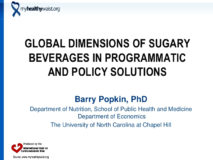
Global dimensions of sugary beverages in programmatic and policy solutions
By Barry Popkin, PhD, Department of Nutrition, School of Public Health and Medicine Department of Economics, The University of North Carolina at Chapel Hill, NC, USA [30 slides] See More
What is the role of abdominal obesity in the pathophysiology of the metabolic syndrome?
Expert opinion by H. Bryan Brewer, Jr., MD, Director, Washington Cardiovascular Associates, Senior Research Consultant, Cardiovascular Research Institute, Washington Hospital Center, Washington, D.C., USA See More
Could you describe the concept of valvulo-metabolic risk?
Expert opinion by Philippe Pibarot, DVM, PhD, FAHA, FACC, FASE, Department of Medicine, Université Laval, Centre de recherche de l’Institut universitaire de cardiologie et de pneumologie de Québec, Québec, QC, Canada See More
Why is CRP such a consistent predictor of cardiovascular disease risk?
Expert opinion by Paul M. Ridker, MD, MPH, FACC, FAHA Divisions of Cardiovascular Diseases and Preventive Medicine, Brigham and Women’s Hospital, Boston, MA, USA See More
Could you identify which are the potentially interesting new targets to modulate insulin sensitivity?
Expert opinion by André Marette, PhD, Department of Medicine, Université Laval, Centre de recherche de l’Institut universitaire de cardiologie et de pneumologie de Québec, Québec, QC, Canada See More
Could you describe the recent evidence that your laboratory has produced linking intra-abdominal (visceral) adipose tissue metabolism to overall global cardiometabolic risk?
Expert opinion by André Tchernof, PhD, Department of Nutrition, Université Laval, Endocrinology and Genomics axis, Laval University Medical Centre, Québec, QC, Canada See More
Could you discuss the link between abdominal obesity and valve diseases?
Expert opinion by Patrick Mathieu, MD, Department of Surgery, Université Laval, Centre de recherche de l’Institut universitaire de cardiologie et de pneumologie de Québec, Québec, QC, Canada See More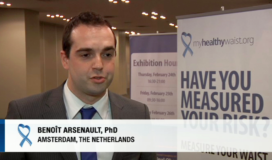
What is hypertriglyceridemic waist and what is its predictive role in the risk of coronary disease?
Expert opinion by Benoit Arsenault, PhD, Department of Vascular Medicine, Academic Medical Center, University of Amsterdam, Amsterdam, The Netherlands See More
Editorial: «Eat less and exercise more» . . . How do we do it?
Prevalence of obesity has achieved massive proportions in several countries [1]. Even parts of the world with a low absolute prevalence of overweight/obesity are now showing spectacular increases leading to a rapid rise in the prevalence of chronic metabolic diseases such as type 2 diabetes [2]. Obviously, to reduce the adiposity of high-risk obese patients, … Continued See More
What are risk factors associated with sedentary lifestyle and poor nutritional habits in Brazil?
Expert opinion by Walmir Coutinho, MD Professor of Endocrinology, Pontifical Catholic University of Rio de Janeiro, Rio de Janeiro, Brazil See More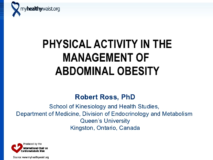
Physical activity in the management of abdominal obesity
By Robert Ross, PhD, Professor, School of Kinesiology and Health Studies, Department of Medicine, Division of Endocrinology and Metabolism, Queen’s University, Kingston, ON, Canada [56 slides] See More
What were the initial observations – including work from your group – that led to the consolidation of the inflammation hypothesis as a cause of CVD and as a potential target of therapy?
Expert opinion by Peter Libby, MD, Chief, Cardiovascular Medicine, Brigham and Women’s Hospital, Mallinckrodt Professor of Medicine, Harvard Medical School, Boston, USA See More
What is the prevalence of CVD risk factors among patients with type 2 diabetes, and how do these factors impact clinical management?
Expert opinion by Nicholas J. Wareham, MB, PhD, Director, MRC Epidemiology Unit, Institute of Metabolic Science, University of Cambridge, Cambridge, UK See More
What is the role of the International Congress on Abdominal Obesity?
Expert opinion by Jean-Pierre Després, PhD, FAHA, FIAS, Scientific Director, International Chair on Cardiometabolic Risk, Professor, Division of Kinesiology, Université Laval, Centre de recherche de l’Institut universitaire de cardiologie et de pneumologie de Québec, Québec, QC, Canada See More
What is the relevance of metabolic syndrome to clinical practice?
Expert opinion by H. Bryan Brewer, Jr., MD, Director, Washington Cardiovascular Associates, Senior Research Consultant, Cardiovascular Research Institute, Washington Hospital Center, Washington, D.C., USA See More
Have you noticed any new or interesting risk markers for cardiovascular diseases?
Expert opinion by Benoit Arsenault, PhD, Department of Vascular Medicine, Academic Medical Center, University of Amsterdam, Amsterdam, The Netherlands See More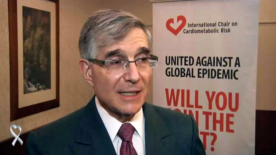
Inflammation and cardiovascular disease: Is intra-abdominal (visceral) obesity the missing link?
Expert opinion by Peter Libby, MD, Mallinckrodt Professor of Medicine, Harvard Medical School and Chief, Cardiovascular Medicine, Brigham & Women’s Hospital, Boston, MA, USA See More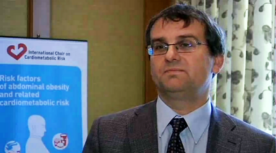
Abdominal obesity: a poorly assessed modifiable cardiovascular disease risk factor
Expert opinion by Paul Poirier, MD, PhD, FRCPC, FACC, FAHA, Associate Professor, Faculty of Pharmacy, Université Laval, Québec City, Quebec, Canada See More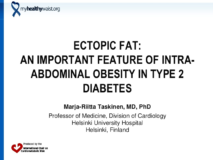
Ectopic Fat: An Important Feature of Intra-Abdominal Obesity in Type 2 Diabetes
By Marja-Riitta Taskinen, MD, PhD, Professor of Medicine, University of Helsinki, Department of Medicine, Biomedicum, Helsinki, Finland [28 slides] See More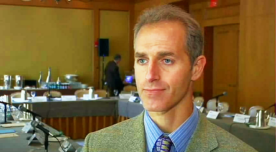
Dietary management of obesity: too much focus on fat?
Expert opinion by Dariush Mozaffarian, MD, PhD, Brigham and Women’s Hospital and Harvard Medical School, Harvard School of Public Health, Boston, MA, USA See More
Respective contributions of the skeletal muscle, the liver, the beta cell, and the brain to insulin resistance
Expert opinion by C. Ronald Kahn, MD, Joslin Diabetes Center, Harvard Medical School, Boston, MA, USA See More
Muscle contraction vs. insulin in the activation of glucose transport in skeletal muscle
Expert opinion by Laurie Goodyear, PhD, Joslin Diabetes Center, Harvard Medical School Boston, MA, USA See More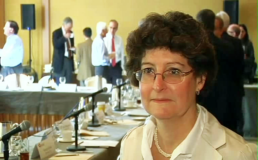
The role of inflammation in the pathophysiology of type 2 diabetes
Expert opinion by Allison B. Goldfine, MD, Joslin Diabetes Center, Harvard Medical School, Boston, MA, USA See More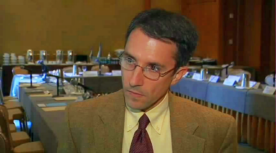
What are the genetic aspects of type 2 diabetes?
Expert opinion by Jose Florez, MD, PhD, Massachusetts General Hospital, Harvard Medical School, Center for Human Genetic Research, Broad Institute of Harvard and MIT, Boston, MA, USA See More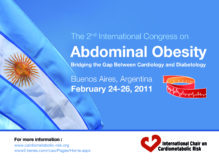
Editorial: The 2nd International Congress on Abdominal Obesity in Buenos Aires: The ICCR enters a new era!
The 2nd ICAO in Buenos Aires: a great success! With more than 500 participants from 60 countries, the International Chair on Cardiometabolic Risk (ICCR) thanks all attendees and speakers who made this 2nd meeting a resounding success. The feedback received from the participants as well as from the invited speakers was excellent. At the ICCR, … Continued See More
What is the next step in our understanding of the relationship between adipose tissue and cardiometabolic risk?
Expert opinion by Michael Jensen, MD, Division of Endocrinology and Metabolism, Department of Internal Medicine, Mayo Clinic and Foundation, Rochester, MN, USA See More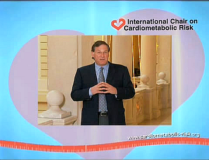
Do prevention guidelines target all patients at risk?
Expert opinion by Richard Nesto, MD, FACC, FAHA, Lahey Clinic Medical Center, Burlington, MA, USA and Harvard Medical School, Boston, MA, USA See More
Could epicardial fat be involved in the pathophysiology of cardiovascular disease?
Expert opinion by Michael Jensen, MD, Division of Endocrinology and Metabolism, Department of Internal Medicine, Mayo Clinic and Foundation, Rochester, MN, USA See More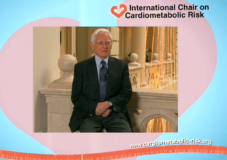
Are lifestyle measures cost-effective?
Expert opinion by Edward Horton, MD, Joslin Diabetes Center, Boston, MA, USA See More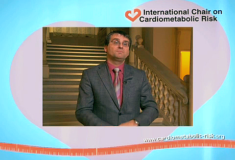
What is your current focus?
Expert opinion by Paul Poirier, MD, PhD, FRCPC, FACC, FAHA, Associate Professor, Faculty of Pharmacy, Université Laval, Québec City, Quebec, Canada See More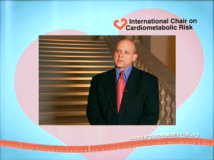
What is your main research focus?
Expert opinion by Jorge Plutzky, MD, Brigham and Women’s Hospital/Harvard Medical School, Boston, MA, USA See More
What simple tools could be used to better assess global CVD risk?
Expert opinion by Richard Nesto, MD, FACC, FAHA, Lahey Clinic Medical Center, Burlington, MA, USA and Harvard Medical School, Boston, MA, USA See More
How does ectopic fat increase cardiovascular disease risk?
Expert opinion by Michael Jensen, MD, Division of Endocrinology and Metabolism, Department of Internal Medicine, Mayo Clinic and Foundation, Rochester, MN, USA See More
Is it possible in clinical practice to target overweight/obesity in patients with type 2 diabetes? If so, how?
Expert opinion by Edward Horton, MD, Joslin Diabetes Center, Boston, MA, USA See More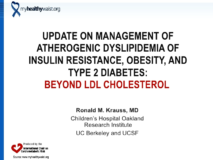
Update on Management of Atherogenic Dyslipidemia of Insulin Resistance, Obesity, and Type 2 Diabetes: Beyond LDL Cholesterol
By Ronald Krauss, MD, Children’s Hospital Oakland Research Institute, Atherosclerosis Research, Oakland, CA, USA [39 slides] See More
Do you believe that inflammation alone plays a role in the pathophysiology of CVD?
Expert opinion by Jorge Plutzky, MD, Brigham and Women’s Hospital/Harvard Medical School, Boston, MA, USA See More
What could be done to better assess global CVD risk in patients with type 2 diabetes? (better algorithms?)
Expert opinion by Richard Nesto, MD, FACC, FAHA, Lahey Clinic Medical Center, Burlington, MA, USA and Harvard Medical School, Boston, MA, USA See More
Could you discuss the pros and cons of portal free fatty acid theory?
Expert opinion by Michael Jensen, MD, Division of Endocrinology and Metabolism, Department of Internal Medicine, Mayo Clinic and Foundation, Rochester, MN, USA See More
What is the role of physical activity and healthy eating habits in the management of type 2 diabetes?
Expert opinion by Edward Horton, MD, Joslin Diabetes Center, Boston, MA, USA See More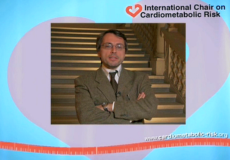
Can a lifestyle modification program have an impact on the endocannabinoid system?
Expert opinion by Vincenzo Di Marzo, PhD, Istituto di Chimica Biomolecolare Pozzuoli, NA, Italy See More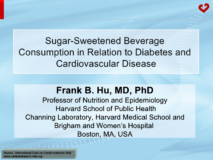
Sugar-sweetened beverage consumption in relation to diabetes and cardiovascular disease
By Frank B. Hu, MD, PhD Professor of Nutrition and Epidemiology Harvard School of Public HealthChanning Laboratory, Harvard Medical School and Brigham and Women’s Hospital [20 slides] See More
With the prevalence of morbid obesity increasing rapidly, what challenge does this pose in cardiology?
Expert opinion by Paul Poirier, MD, PhD, FRCPC, FACC, FAHA, Associate Professor, Faculty of Pharmacy, Université Laval, Québec City, Quebec, Canada See More
Could you summarize the mechanistic links between insulin resistance and atherosclerosis in type 2 diabetes?
Expert opinion by Jorge Plutzky, MD, Brigham and Women’s Hospital/Harvard Medical School, Boston, MA, USA See More
Could you comment on the evolving landscape of CVD risk factors in type 2 diabetic patients over the last 30 years?
Expert opinion by Richard Nesto, MD, FACC, FAHA, Lahey Clinic Medical Center, Burlington, MA, USA and Harvard Medical School, Boston, MA, USA See More
What role does adipose tissue play in the pathophysiology of type 2 diabetes?
Expert opinion by Michael Jensen, MD, Division of Endocrinology and Metabolism, Department of Internal Medicine, Mayo Clinic and Foundation, Rochester, MN, USA See More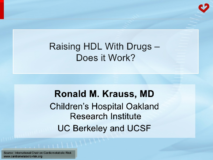
Raising HDL with drugs – does it work?
By Ronald Krauss, MD, Children’s Hospital Oakland Research Institute, Atherosclerosis Research, Oakland, CA, USA [41 slides] See More
Can some therapies delay the onset of type 2 diabetes?
Expert opinion by Edward Horton, MD, Joslin Diabetes Center, Boston, MA, USA See More
Do you think that CB1 antagonists need to have a CNS-mediated effect in order to help us manage high-risk abdominally obese patients?
Expert opinion by Vincenzo Di Marzo, PhD, Istituto di Chimica Biomolecolare Pozzuoli, NA, Italy See More
Do you think that there is a “healthy” BMI?
Expert opinion by Paul Poirier, MD, PhD, FRCPC, FACC, FAHA, Associate Professor, Faculty of Pharmacy, Université Laval, Québec City, Quebec, Canada See More
Could CRP facilitate the identification of patients at risk?
Expert opinion by Jorge Plutzky, MD, Brigham and Women’s Hospital/Harvard Medical School, Boston, MA, USA See More
What impact does lowering glucose have on reducing residual risk?
Expert opinion by Richard Nesto, MD, FACC, FAHA, Lahey Clinic Medical Center, Burlington, MA, USA and Harvard Medical School, Boston, MA, USA See More
Is intra-abdominal (visceral) fat involved in the pathogenesis of the metabolic syndrome?
Expert opinion by Michael Jensen, MD, Division of Endocrinology and Metabolism, Department of Internal Medicine, Mayo Clinic and Foundation, Rochester, MN, USA See More
Do you believe that type 2 diabetes is a CHD risk equivalent?
Expert opinion by Edward Horton, MD, Joslin Diabetes Center, Boston, MA, USA See More
Editorial: Sugar-sweetened beverages and risk of type 2 diabetes
In recent decades, consumption of sugar-sweetened beverages (SSBs) has been rising rapidly worldwide. SSBs include the full spectrum of soft drinks (soda), fruit drinks, and energy and vitamin water drinks. In the US between the late 1970’s and 2001 the percentage of total calories consumed from SSBs increased from 3.9% to 9.2% [1]. Similar trends … Continued See More
Do you think that waist circumference will ever replace or complement the BMI?
Expert opinion by Paul Poirier, MD, PhD, FRCPC, FACC, FAHA, Associate Professor, Faculty of Pharmacy, Université Laval, Québec City, Quebec, Canada See More
What mediators could be implicated in the modulation of inflammation through the activation of PPAR alpha or gamma?
Expert opinion by Jorge Plutzky, MD, Brigham and Women’s Hospital/Harvard Medical School, Boston, MA, USA See More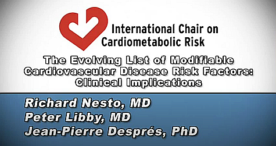
Webcast: The evolving list of modifiable cardiovascular disease risk factors: clinical implications
Dr. Jean-Pierre Després, Dr. Peter Libby and Dr. Richard Nesto begin this round table by talking about inflammation, type 2 diabetes and cardiovascular disease. Dr. Libby emphasizes the notion that the issue of inflammation has made progress and allows to refine patient’s clinical evaluation. Dr. Nesto talks about his concern that in the next 20 … Continued See More
Why are diabetic patients still at elevated residual risk despite the polypharmacy currently used?
Expert opinion by Richard Nesto, MD, FACC, FAHA, Lahey Clinic Medical Center, Burlington, MA, USA and Harvard Medical School, Boston, MA, USA See More
What factors influence fat storage?
Expert opinion by Michael Jensen, MD, Division of Endocrinology and Metabolism, Department of Internal Medicine, Mayo Clinic and Foundation, Rochester, MN, USA See More
Are there any treatments indicated in the pre-diabetic state?
Expert opinion by Edward Horton, MD, Joslin Diabetes Center, Boston, MA, USA See More
How do you define high risk obesity in cardiology?
Expert opinion by Paul Poirier, MD, PhD, FRCPC, FACC, FAHA, Associate Professor, Faculty of Pharmacy, Université Laval, Québec City, Quebec, Canada See More
What is the role of PPAR agonists in the relationship of inflammation to type 2 diabetes?
Expert opinion by Jorge Plutzky, MD, Brigham and Women’s Hospital/Harvard Medical School, Boston, MA, USA See More
How important is reducing hyperglycemia in the management of CVD risk in diabetic patients?
Expert opinion by Richard Nesto, MD, FACC, FAHA, Lahey Clinic Medical Center, Burlington, MA, USA and Harvard Medical School, Boston, MA, USA See More
Why are we shaped differently, and why does it matter?
Expert opinion by Michael Jensen, MD, Professor of Medicine, Division of Endocrinology and Metabolism, Department of Internal Medicine, Mayo Clinic and Foundation, Rochester, MN, USA See More
What are the current recommendations for the management of patients at risk for type 2 diabetes?
Expert opinion by Edward Horton, MD, Joslin Diabetes Center, Boston, MA, USA See More
What evidence do we have that systemic CB1 receptors are important in the pathophysiology of glycemia?
Expert opinion by Vincenzo Di Marzo, PhD, Istituto di Chimica Biomolecolare Pozzuoli, NA, Italy See More
Editorial: The ICCR has had another successful joint meeting with the EAS in Hamburg
The International Chair on Cardiometabolic Risk (ICCR) has organized another successful and well attended symposium at the European Atherosclerosis Society (EAS) meeting held from June 20 to 23, 2010 in Hamburg, Germany. This joint ICCR/EAS symposium, co-chaired by Prof. Marja-Riitta Taskinen from University of Helsinki, Finland and by Prof. Luc Van Gaal from University of … Continued See More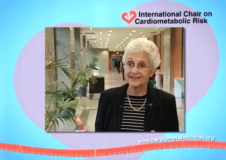
Where should we focus our prevention efforts: in schools?
Expert opinion by Barbara V. Howard, PhD, Medstar Research Institute, Washington, DC, USA See More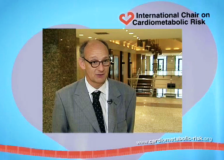
Why do elevated HDL cholesterol concentrations not protect against cardiovascular disease?
Expert opinion by Arnold von Eckardstein, MD Institute of Clinical Chemistry, University Hospital of Zurich and Center for Integrative Human Biology, University of Zurich, Zurich, Switzerland See More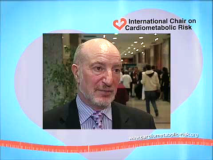
Are we ready to measure apolipoprotein B in clinical practice?
Expert opinion by Chris Packard, DSc, FRSE, Research Director, North Glasgow University Hospital, Professor of Vascular Biochemistry, University of Glasgow, Glasgow, UK See More
How should the consumption of healthy foods be promoted?
Expert opinion by Barbara V. Howard, PhD, Medstar Research Institute, Washington, DC, USA See More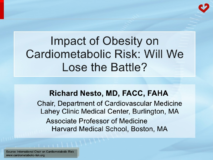
Impact of obesity on cardiometabolic risk: Will we lose the battle?
By Richard Nesto, MD, FACC, FAHA, Lahey Clinic Medical Center, Burlington, MA, USA and Harvard Medical School, Boston, MA, USA [22 slides] See More
What are the best therapeutic options to improve HDL functions?
Expert opinion by Arnold von Eckardstein, MD Institute of Clinical Chemistry, University Hospital of Zurich and Center for Integrative Human Biology, University of Zurich, Zurich, Switzerland See More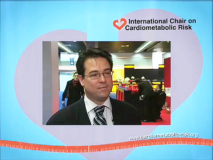
Could you comment on the fat storage capacity of different abdominal fat compartments?
Expert opinion by André Tchernof, PhD Molecular Endocrinology and Oncology Research Centre, Laval University Medical Research Centre, Québec, QC, Canada See More
Should nutritional supplements be recommended?
Expert opinion by Barbara V. Howard, PhD, Medstar Research Institute, Washington, DC, USA See More
What is the relationship between HDL and the endothelium?
Expert opinion by Arnold von Eckardstein, MD Institute of Clinical Chemistry, University Hospital of Zurich and Center for Integrative Human Biology, University of Zurich, Zurich, Switzerland See More
Webcast: Per Björntorp/Jean Vague Lecture Award Recipient 2009
Determinants of abdominal obesity, nutrition and cardiometabolic health are discussed in this video by Drs. Robert Ross and Frank Hu in which the concept of nutritional quality is also addressed. For instance, Dr. Hu underlines the deleterious impact of an overconsumption of sugar-sweetened beverages on body weight, abdominal obesity and type 2 diabetes. He also … Continued See More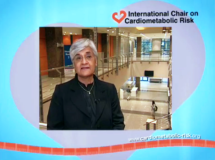
Could you clarify the role of macrophages and the importance of angiogenesis?
Expert opinion by Renu Virmani, MD CVPath Institute, Gaithersburg, MD, USA See More
With regards to the endocrine properties of adipose tissue, which fat compartment is responsible for the hypoadiponectinemia found in obese subjects?
Expert opinion by André Tchernof, PhD Molecular Endocrinology and Oncology Research Centre, Laval University Medical Research Centre, Québec, QC, Canada See More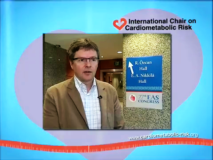
What is the status of PPAR-alpha agonists as targets for type 2 diabetes and cardiovascular disease?
Expert opinion by Bart Staels, PhD Department of Atherosclerosis, Institut Pasteur de Lille, UMR545 Inserm, University of Lille 2, Lille, France See More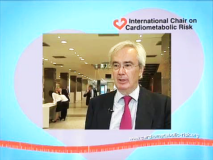
In the ONTARGET study, how do you explain the disconnect between the blood pressure-lowering effects of combined therapy and the lack of further reduction in CVD events?
Expert opinion by Luis Miguel Ruilope, MD, Professor, Internal Medicine, Complutense University, Head of the Hypertension Unit, 12 de Octubre Hospital, Madrid, Spain See More
Why could apolipoprotein B be better than LDL cholesterol in evaluating the success of therapy?
Expert opinion by Chris Packard, DSc, FRSE, Research Director, North Glasgow University Hospital, Professor of Vascular Biochemistry, University of Glasgow, Glasgow, UK See More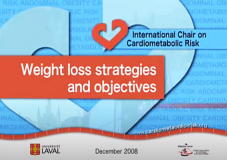
Webcast: Weight loss strategies and objectives
In this video, Dr. Arya Sharma notes that people do not necessarily have to lose a large percentage of their body weight in order to get clinical benefits. Patients can get significant beneficial effects by losing only 5% of their body weight, which could be associated with a 20% to 30% loss of intra-abdominal (visceral) … Continued See More
What are the key features of a cardioprotective diet?
Expert opinion by Barbara V. Howard, PhD, Medstar Research Institute, Washington, DC, USA See More
Does CB1 activation affect ectopic fat accumulation?
Expert opinion by Vincenzo Di Marzo, PhD, Istituto di Chimica Biomolecolare Pozzuoli, NA, Italy See More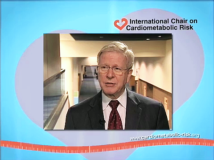
What is the potential benefit of HDL cholesterol infusion?
Expert opinion by H. Bryan Brewer Jr. MD, Director, Lipoprotein and Atherosclerosis Research, MedStar Research Institute, Cardiovascular Research Institute, Washington, DC, USA See More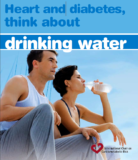
Another successful ICCR symposium at the MEDEC 2010 Conference in Paris!
On March 17, the International Chair on Cardiometabolic Risk (ICCR) held another successful and well-attended symposium at the MEDEC 2010 which is the annual French primary care physicians conference. The purpose of the symposium was to raise the family physicians awareness on the relationships between the consumption of sugar-sweetened beverages (SSB) and the risk of … Continued See More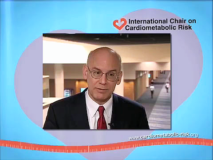
What simple lipid targets would you recommend in clinical practice?
Expert opinion by Christie Ballantyne, MD, FACC, FACP, Director, Center for Cardiovascular Disease Prevention, Chief Section of Atherosclerosis and Vascular Medicine, Methodist DeBakey Heart Center and Baylor College of Medicine, Houston, TX, USA See More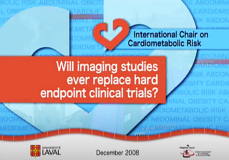
Webcast: Will imaging studies ever replace hard endpoint clinical trials?
Dr. Juan Badimon and Dr. John Kastelein argue that while imaging studies are not ready to substitute for “hard” endpoint clinical trials, they nevertheless add important information on atherosclerotic plaque development. Although imaging studies are very important in clinical drug development programs, the ideal imaging study/methodology has not yet been established. Dr. Christie Ballantyne also … Continued See More
Could you summarize the protective roles of HDL particles? Do high HDL levels confer greater protection?
Expert opinion by Arnold von Eckardstein, MD Institute of Clinical Chemistry, University Hospital of Zurich and Center for Integrative Human Biology, University of Zurich, Zurich, Switzerland See More
What about the effects of HRT on quality of life?
Expert opinion by Barbara V. Howard, PhD, Medstar Research Institute, Washington, DC, USA See More
What is the importance of hemorrhage in the natural progression of plaques?
Expert opinion by Renu Virmani, MD CVPath Institute, Gaithersburg, MD, USA See More
What is the importance of adipocyte size?
Expert opinion by André Tchernof, PhD Molecular Endocrinology and Oncology Research Centre, Laval University Medical Research Centre, Québec, QC, Canada See More
What are the current indications for HRT?
Expert opinion by Barbara V. Howard, PhD, Medstar Research Institute, Washington, DC, USA See More
From the ONTARGET study results, does the method used to reduce blood pressure matter in terms of its impact on cardiovascular events?
Expert opinion by Luis Miguel Ruilope, MD, Professor, Internal Medicine, Complutense University, Head of the Hypertension Unit, 12 de Octubre Hospital, Madrid, Spain See More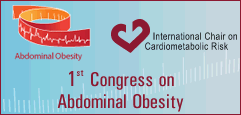
Editorial: The first International Congress on Abdominal Obesity: a resounding success!
The First International Congress on Abdominal Obesity was held in Hong Kong on January 28-30. After 5 years of activities, we, at the International Chair on Cardiometabolic Risk (ICCR), felt that the time had come to organize an international meeting devoted entirely to abdominal obesity. Indeed, despite the fact that there has been a proliferation … Continued See More
Why could apolipoprotein B be better than cholesterol in estimating cardiovascular disease risk?
Expert opinion by Chris Packard, DSc, FRSE , Research Director, North Glasgow University Hospital, Professor of Vascular Biochemistry, University of Glasgow, Glasgow, UK See More
Is the debate over regarding the harmful cardiovascular effects of HRT in post-menopausal women?
Expert opinion by Barbara V. Howard, PhD, Medstar Research Institute, Washington, DC, USA See More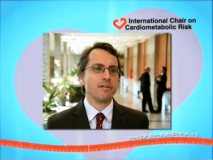
What are the effects of CB1 activation on adipocytes?
Expert opinion by Vincenzo Di Marzo, PhD, Istituto di Chimica Biomolecolare Pozzuoli, NA, Italy See More
Are better drugs available to raise HDL cholesterol?
Expert opinion by H. Bryan Brewer, Jr., MD, Director, Lipoprotein and Atherosclerosis Research, MedStar Research Institute, Cardiovascular Research Institute, Washington, DC, USA See More
In which patients should we measure apolipoprotein B?
Expert opinion by Christie Ballantyne, MD, FACC, FACP, Director, Center for Cardiovascular Disease Prevention, Chief Section of Atherosclerosis and Vascular Medicine, Methodist DeBakey Heart Center and Baylor College of Medicine, Houston, TX, USA See More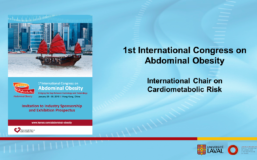
Editorial: See you in Hong Kong!
When the International Chair on Cardiometabolic Risk (ICCR) was launched in 2005, a key objective identified by the multidisciplinary group of experts gathered together under the umbrella of the Chair was the development of a comprehensive educational program on the causes and consequences of abdominal obesity. This led to the creation of our educational website … Continued See More
Could there be a link between HDL and diabetes?
Expert opinion by Arnold von Eckardstein, MD Institute of Clinical Chemistry, University Hospital of Zurich and Center for Integrative Human Biology, University of Zurich, Zurich, Switzerland See More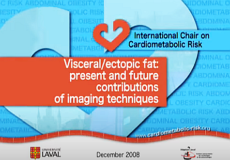
Webcast: Visceral/ectopic fat: present and future contributions of imaging techniques
Dr. Jeffrey Carr explains how computed tomography and magnetic resonance imaging are two of the most useful imaging tools to localize and measure ectopic fat. Dr. Carr explains that ectopic fat depots are much more important than the amount of total body fat. He further explains that imaging techniques will help better describe the effects … Continued See More
Why do we need to improve the current atherosclerosis classification?
Expert opinion by Renu Virmani, MD CVPath Institute, Gaithersburg, MD, USA See More
What are the differences between the subcutaneous fat compartment and the intra-abdominal fat compartment?
Expert opinion by André Tchernof, PhD Molecular Endocrinology and Oncology Research Centre, Laval University Medical Research Centre, Québec, QC, Canada See More
Do you think that the relationship between adiponectin and HDL is mediated by this adipokine’s effect on the liver?
Expert opinion by Bart Staels, PhD Department of Atherosclerosis, Institut Pasteur de Lille, UMR545 Inserm, University of Lille 2, Lille, France See More
Can we really prevent renal disease or do we only delay its complications?
Expert opinion by Luis Miguel Ruilope, MD, Professor, Internal Medicine, Complutense University, Head of the Hypertension Unit, 12 de Octubre Hospital, Madrid, Spain See More
Do you believe that the small, dense LDL phenotype is independently predictive of an increased risk of cardiovascular disease?
Expert opinion by Chris Packard, DSc, FRSE, Research Director, North Glasgow University Hospital, Professor of Vascular Biochemistry, University of Glasgow, Glasgow, UK See More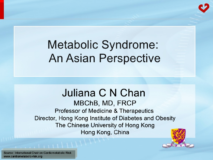
Metabolic syndrome: an Asian perspective
By Juliana C N Chan, MBChB, MD, FRCP Professor of Medicine & Therapeutics, Director, Hong Kong Institute of Diabetes and Obesity, The Chinese University of Hong Kong, Hong Kong, China [36 slides] See More
What is the status of cardiovascular prevention in post-menopausal women?
Expert opinion by Barbara V. Howard, PhD, Medstar Research Institute, Washington, DC, USA See More
Where does HDL cholesterol come from?
Expert opinion by H. Bryan Brewer Jr. MD, Director, Lipoprotein and Atherosclerosis Research, MedStar Research Institute, Cardiovascular Research Institute, Washington, DC, USA See More
Can LDL size be measured in clinical practice?
Expert opinion by Christie Ballantyne, MD, FACC, FACP, Director, Center for Cardiovascular Disease Prevention, Chief Section of Atherosclerosis and Vascular Medicine, Methodist DeBakey Heart Center and Baylor College of Medicine, Houston, TX, USA See More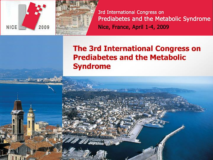
Webcast: Calories from beverages: an underestimated dietary target for the prevention/management of obesity/type 2 diabetes?
The International Chair on Cardiometabolic Risk held a symposium on calories from beverages at the 3rd International Congress on Prediabetes and the Metabolic Syndrome in Nice. The symposium was chaired by Drs. Luc Van Gaal and Jean-Pierre Després. Drs. Barry Popkin, George Bray and Frank Hu were the featured speakers and highlighted the fact that … Continued See More
Could you comment on the heterogeneity of risk in type 2 diabetic patients?
Expert opinion by Arnold von Eckardstein, MD Institute of Clinical Chemistry, University Hospital of Zurich and Center for Integrative Human Biology, University of Zurich, Zurich, Switzerland See More
Why is it important to understand the process of atherosclerosis?
Expert opinion by Renu Virmani, MD CVPath Institute, Gaithersburg, MD, USA See More
What is the biological nature of visceral fat?
Expert opinion by André Tchernof, PhD Molecular Endocrinology and Oncology Research Centre, Laval University Medical Research Centre, Québec, QC, Canada See More
Could you comment on the status of PPARy and beta/delta ?
Expert opinion by Bart Staels, PhD Department of Atherosclerosis, Institut Pasteur de Lille, UMR545 Inserm, University of Lille 2, Lille, France See More
Webcast: Per Björntorp/Jean Vague Lecture Award Recipient 2008
This portrait gives an overview of the many accomplishments and overall contribution of Prof. Yuji Matsuzawa to the field of cardiovascular and obesity research. Prof. Matsuzawa received the Per Björntorp/Jean Vague Lecture Award at the annual meeting of the International Chair on Cardiometabolic Risk held in Budapest, Hungary in 2008. Two of his major contributions … Continued See More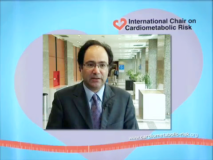
Does obesity surgery work for everybody?
Expert opinion by Arya Sharma, MD, FRCPC, Professor of Medicine and Chair for Obesity Research and Management, University of Alberta, Canada See More
What is the link between abdominal obesity and renal disease?
Expert opinion by Luis Miguel Ruilope, MD, Professor, Internal Medicine, Complutense University, Head of the Hypertension Unit, 12 de Octubre Hospital, Madrid, Spain See More
Could you comment on the role of hepatic fat accumulation as a potential contributing factor to the development of type 2 diabetes?
Expert opinion by Benoit Arsenault, PhD, Professor, Faculty of Medicine, Université Laval, Centre de recherche de l’IUCPQ, Québec, QC, Canada See More
Editorial: Interleukin-6: A link between obesity, insulin resistance and NAFLD/NASH?
Interleukin-6 (IL-6) is a highly proinflammatory molecule in many cells, including adipose and liver cells. It is widely produced, but the adipose tissue accounts for a substantial part (around 30%) [1]. The release of IL-6 is related to adipose cell size and, thus, increased in obesity [2]. Elevated levels of IL-6 induce insulin resistance in … Continued See More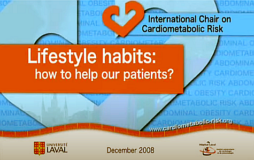
Webcast: Lifestyle habits: how to help our patients?
Dr. Lori Mosca discusses results and key aspects of the FIT Heart Study, a trial looking at healthy family members of patients hospitalized for an acute cardiovascular event. The study found that many family members were unaware of the fact that they had elevated cholesterol levels and high blood pressure. It helped identify individuals who … Continued See More
Is there a renewed interest in the role of adipose tissue in the pathophysiology of the metabolic syndrome?
Expert opinion by Ulf Smith, MD, PhD, Professor of Internal Medicine, The Lundberg Laboratory for Diabetes Research, Center of Excellence for Cardiovascular and Metabolic Research, Sahlgrenska Academy, Göteborg University, Göteborg, Sweden See More
Is there a need for a global cardiometabolic risk algorithm?
Expert opinion by Jean-Pierre Després, PhD, FAHA, FIAS, Scientific Director, International Chair on Cardiometabolic Risk, Professor, Division of Kinesiology, Université Laval, Centre de recherche de l’Institut universitaire de cardiologie et de pneumologie de Québec, Québec, QC, Canada See More
The endocrine function of adipose tissue has been an exciting development. However, there is a plethora of ‘adipokines’. Which ones are getting closer to prime time and why?
Expert opinion by Ulf Smith, MD, PhD, Professor of Internal Medicine, The Lundberg Laboratory for Diabetes Research, Center of Excellence for Cardiovascular and Metabolic Research, Sahlgrenska Academy, Göteborg University, Göteborg, Sweden See More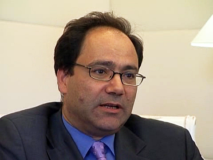
How do you see the contribution of hypoadiponectinemic state of visceral obesity in the modulation of global cardiometabolic risk?
Expert opinion by Arya Sharma, MD, FRCPC, Professor of Medicine and Chair for Obesity Research and Management, University of Alberta, Edmonton, Canada See More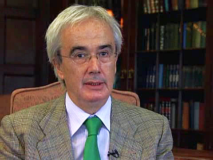
Could you comment on how the presence/absence of the metabolic syndrome affects the management of patients with hypertension?
Expert opinion by Luis Miguel Ruilope, MD, Professor, Internal Medicine, Complutense University, Head of the Hypertension Unit, 12 de Octubre Hospital, Madrid, Spain See More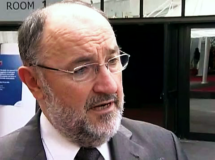
How do you see the mobilization of fat cells?
Expert opinion by Max Lafontan, PhD, Research Director, INSERM, Laboratoire de Recherche sur les Obésités, U858, Institut de Médecine Moléculaire de Rangueil, Toulouse, France See More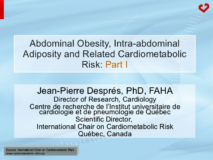
Abdominal obesity, intra-abdominal adiposity and related cardiometabolic risk: part I
By Jean-Pierre Després, PhD, FAHA, FIAS, Scientific Director, International Chair on Cardiometabolic Risk, Professor, Division of Kinesiology, Université Laval, Centre de recherche de l’Institut universitaire de cardiologie et de pneumologie de Québec, Québec, QC, Canad [30 slides] See More
Is it possible to implement a lifestyle modification program in clinical practice?
Expert opinion by Jean-Pierre Després, PhD, FAHA, FIAS, Scientific Director, International Chair on Cardiometabolic Risk, Professor, Division of Kinesiology, Université Laval, Centre de recherche de l’Institut universitaire de cardiologie et de pneumologie de Québec, Québec, QC, Canada See More
What is the mechanism for the low HDL cholesterol levels in patients with abdominal obesity and the metabolic syndrome?
Expert opinion by Philip J. Barter, MD, MBBS, FRACP, PhD, Professor and Director, the Heart Research Institute, Sydney, Australia See More
Implications of recent clinical trials targeting glycemia to reduce cardiovascular risk: insights on prevention of cardiovascular disease in insulin resistant syndromes
People with type 2 diabetes mellitus experience higher risk for cardiovascular disease (CVD) than persons without diabetes. The risk, however, has declined over the years as the recommendations for both primary and secondary prevention of cardiovascular (CV) events have been strengthened primarily through LDL lowering with statins and the adoption of lower targets for blood … Continued See More
What is the key message from the INTERHEART study?
Expert opinion by Luc Van Gaal, MD, PhD, Professor of Medicine, Antwerp University Hospital, Faculty of Medicine, Department of Diabetology, Metabolism & Clinical Nutrition, Antwerp, Belgium See More
Your own work has focused on the cytokine IL-6. How important is adipose tissue in the production/effect of that cytokine in abdominal obesity? Is this cytokine atherogenic and diabetogenic?
Expert opinion by Ulf Smith, MD, PhD, Professor of Internal Medicine, The Lundberg Laboratory for Diabetes Research, Center of Excellence for Cardiovascular and Metabolic Research, Sahlgrenska Academy, Göteborg University, Göteborg, Sweden See More
How exciting for you is the discovery of adiponectin?
Expert opinion by Arya Sharma, MD, FRCPC, Professor of Medicine and Chair for Obesity Research and Management, University of Alberta, Edmonton, Canada See More
How do you see global CVD risk assessment in the future?
Expert opinion by Luis Miguel Ruilope, MD, Professor, Internal Medicine, Complutense University, Head of the Hypertension Unit, 12 de Octubre Hospital, Madrid, Spain See More
What are the next steps in the biology of adipose tissue?
Expert opinion by Max Lafontan, PhD, Research Director, INSERM, Laboratoire de Recherche sur les Obésités, U858, Institut de Médecine Moléculaire de Rangueil, Toulouse, France See More
Can we measure waist circumference in clinical practice? Does it make a difference?
Expert opinion by Jean-Pierre Després, PhD, FAHA, FIAS, Scientific Director, International Chair on Cardiometabolic Risk, Professor, Division of Kinesiology, Université Laval, Centre de recherche de l’Institut universitaire de cardiologie et de pneumologie de Québec, Québec, QC, Canada See More
How much progress has been made in the development of screening tools to identify individuals with features of the metabolic syndrome in the Asian population?
Expert opinion by Juliana Chan, MD, FRCP, Professor of Medicine and Therapeutics, Director, Hong Kong Institute of Diabetes and Obesity, The Chinese University of Hong Kong, Hong Kong SAR, China See More
What is the role of low HDL cholesterol in the elevated CHD risk of metabolic syndrome patients?
Expert opinion by Philip J. Barter, MD, MBBS, FRACP, PhD, Professor and Director, the Heart Research Institute, Sydney, Australia See More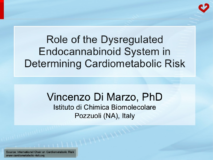
Role of the dysregulated endocannabinoid system in determining cardiometabolic risk
By Vincenzo Di Marzo, PhD, Istituto di Chimica Biomolecolare Pozzuoli, NA, Italy [9 slides] See More
Could you comment on waist circumference measurement variability?
Expert opinion by Luc Van Gaal, MD, PhD, Professor of Medicine, Antwerp University Hospital, Faculty of Medicine, Department of Diabetology, Metabolism & Clinical Nutrition, Antwerp, Belgium See More
Do you see a primary defect in the adipose tissue of individuals with a strong family history of diabetes or should we look elsewhere?
Expert opinion by Ulf Smith, MD, PhD, Professor of Internal Medicine, The Lundberg Laboratory for Diabetes Research, Center of Excellence for Cardiovascular and Metabolic Research, Sahlgrenska Academy, Göteborg University, Göteborg, Sweden See More
Could you comment on the role played by expanded visceral adipose tissue as an endocrine organ?
Expert opinion by Arya Sharma, MD, FRCPC, Professor of Medicine and Chair for Obesity Research and Management, University of Alberta, Edmonton, Canada See More
Could you comment on the fact that about 50% of hypertensive patients have insulin resistance whereas the other half do not show evidence of insulin resistance?
Expert opinion by Luis Miguel Ruilope, MD, Professor, Internal Medicine, Complutense University, Head of the Hypertension Unit, 12 de Octubre Hospital, Madrid, Spain See More
What is the right amount of fat?
Expert opinion by Stephen O’Rahilly, MD, FRCP, FRS, Head of Department and Professor of Clinical Biochemistry and Medicine, University of Cambridge, Cambridge, UK See More
Could you comment on the biology of adipose tissue?
Expert opinion by Max Lafontan, PhD, Research Director, INSERM, Laboratoire de Recherche sur les Obésités, U858, Institut de Médecine Moléculaire de Rangueil, Toulouse, France See More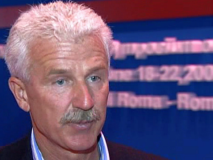
Considering the strengths and limitations of carotid IMT measurement, what have we learned from it regarding CVD factors: confirmatory findings or new factors/markers?
Expert opinion by John J. Kastelein, MD, Professor of Medicine and Chairman of the Department of Vascular Medicine at the University of Amsterdam, Amsterdam, The Netherlands See More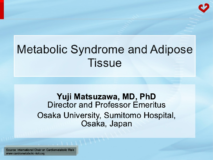
Metabolic syndrome and adipose tissue
By Yuji Matsuzawa, MD, PhD, Director, Professor Emeritus Osaka University, Somitomo Hospital, Osaka, Japan [11 slides] See More
What can the family doctor do to assess global cardiometabolic risk?
Expert opinion by Jean-Pierre Després, PhD, FAHA, FIAS, Scientific Director, International Chair on Cardiometabolic Risk, Professor, Division of Kinesiology, Université Laval, Centre de recherche de l’Institut universitaire de cardiologie et de pneumologie de Québec, Québec, QC, Canada See More
Is there evidence for population differences in the relationship of waist circumference to visceral fat deposition?
Expert opinion by Juliana Chan, MD, FRCP, Professor of Medicine and Therapeutics, Director, Hong Kong Institute of Diabetes and Obesity, The Chinese University of Hong Kong, Hong Kong SAR, China See More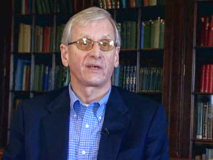
Visceral obesity has been shown to be the atherogenic/diabetogenic form of obesity. Why are we still talking about weight and BMI?
Expert opinion by John D. Brunzell, MD, Professor of Medicine-Emeritus, active, University of Washington, Department of Medicine, Division of Metabolism, Endocrinology and Nutrition, Seattle, WA, USA See More
What are the approaches to increase HDL cholesterol?
Expert opinion by H. Bryan Brewer, Jr., MD, Director, Lipoprotein and Atherosclerosis Research, MedStar Research Institute, Cardiovascular Research Institute, Washington, DC, USA See More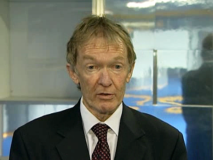
Why is it important to raise HDL cholesterol levels?
Expert opinion by Philip J. Barter, MD, MBBS, FRACP, PhD, Professor and Director, the Heart Research Institute, Sydney, Australia See More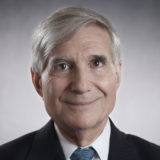
Editorial: Fire extinguishers. Are there new strategies for controlling the inflammation that ignites atherosclerosis?
Gratifying advances over the last decades have furnished cardiovascular specialists with multiple tools to address many aspects of the traditional risk factor profile. We now have at our disposal effective methods for managing high levels of LDL, controlling blood pressure, and even curbing smoking, which has finally declined in the United States. Nonetheless, even those … Continued See More
Could you comment on the importance of measuring waist circumference beyond BMI to properly identify high-risk patients?
Expert opinion by Luc Van Gaal, MD, PhD, Professor of Medicine, Antwerp University Hospital, Faculty of Medicine, Department of Diabetology, Metabolism & Clinical Nutrition, Antwerp, Belgium See More
Do you think that omental fat per se plays a role in the pathophysiology of the metabolic syndrome or is it just a marker of “dysfunctional” adipose tissue?
Expert opinion by Ulf Smith, MD, PhD, Professor of Internal Medicine, The Lundberg Laboratory for Diabetes Research, Center of Excellence for Cardiovascular and Metabolic Research, Sahlgrenska Academy, Göteborg University, Göteborg, Sweden See More
What is the role of adipose tissue function in the overall “dysmetabolic” profile found in abdominally obese type 2 diabetic patients?
Expert opinion by Ulf Smith, MD, PhD, Professor of Internal Medicine, The Lundberg Laboratory for Diabetes Research, Center of Excellence for Cardiovascular and Metabolic Research, Sahlgrenska Academy, Göteborg University, Göteborg, Sweden See More
What are the anti-inflammatory properties of HDL?
Expert opinion by H. Bryan Brewer, Jr., MD, Director, Lipoprotein and Atherosclerosis Research, MedStar Research Institute, Cardiovascular Research Institute, Washington, DC, USA See More
Editorial: Metabolic abnormalities in people with abdominal obesity: low levels of high-density lipoproteins
An inverse relationship between the level of high-density lipoprotein (HDL) cholesterol and the risk of developing premature cardiovascular disease (CVD) has been a consistent finding in prospective population studies. In several of these studies the level of HDL cholesterol has been the single most powerful lipid predictor of future CHD events. The increased CVD risk … Continued See More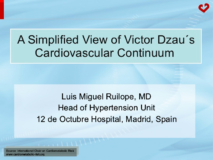
A simplified view of Victor Dzau?s cardiovascular continuum
By Luis Miguel Ruilope, MD, Professor, Internal Medicine, Complutense University, Head of the Hypertension Unit, 12 de Octubre Hospital, Madrid, Spain [5 slides] See More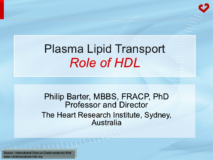
Plasma lipid transport – Role of HDL
By Philip J. Barter, MD, MBBS, FRACP, PhD, Professor and Director, the Heart Research Institute, Sydney, Australia [19 slides] See More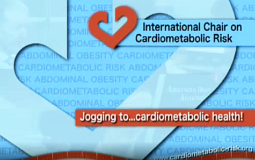
Webcast: Jogging to…cardiometabolic health!
During a run in Jardins des Tuileries, Dr. Jean-Pierre Després and Jean-Claude Coubard from the Chair discuss the importance of physical activity and healthy nutritional habits in reducing abdominal obesity and the risk of type 2 diabetes and heart disease. See More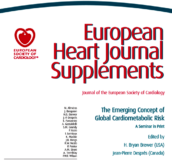
Editorial: International Chair on Cardiometabolic Risk to publish a supplement in the European Heart Journal
Among the Chair’s many educational and information activities, publications are one of the tools on which Chair members place special focus. These publications capture the work done by Chair members as well as by other experts invited to our bi-annual meetings. Whether they are original contributions or review articles, Chair publications are in keeping with … Continued See More
Editorial: Recent activities of the Chair
The International Chair on Cardiometabolic Risk (ICCR) held another productive meeting in Paris on December 15, 2007. The meeting was a success on several fronts and enabled us to generate content for the next issue of the CMReJournal, our new e-journal that provides concise reviews of recent key publications and endeavours to convey important clinical … Continued See More
Editorial: Abdominal obesity and CHD risk: further evidence from the EPIC-Norfolk large prospective study
In our previous editorial, we reviewed the results of the large international observational study (IDEA) published in October 2007 [1]. This study provided evidence that waist circumference predicted diabetes and cardiovascular disease (CVD) prevalence in a sample of nearly 170,000 patients followed by primary care physicians in 63 countries worldwide. Although it was very large … Continued See More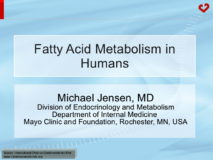
Fatty acid metabolism in humans
By Michael Jensen, MD, Professor of Medicine, Division of Endocrinology and Metabolism, Department of Internal Medicine, Mayo Clinic and Foundation, Rochester, MN, USA [41 slides] See More
The IDEA study: From kilos and metres squared to centimetres and mmol/l
As an anthropometric marker of abdominal obesity, an elevated waist circumference is gaining recognition as a risk factor for type 2 diabetes and cardiovascular disease (CVD) 1-3. However, some still debate whether measuring the waistline is feasible in clinical practice and whether this measurement adds to the information provided by an index of relative weight … Continued See More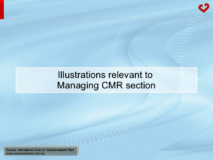
Managing cardiometabolic risk
By The International Chair on Cardiometabolic Risk [18 slides] See More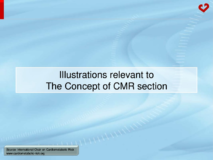
The concept of cardiometabolic risk
By The International Chair on Cardiometabolic Risk [59 slides] See More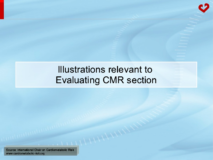
Evaluating cardiometabolic risk
By The International Chair on Cardiometabolic Risk [31 slides] See More
Webcast: Post-AHA 2006: An Expert Look (Part 3)
Dr. Peter Libby moderates this post-AHA 2006 session with Dr. Jean-Pierre Després and Dr. Luc Van Gaal on how and why the atherogenic and diabetogenic lifestyle should be modified. The video also includes the views of Dr. Scott Grundy and Dr. Steven Blair on the topic. See More
Webcast: Post-AHA 2006: An Expert Look (Part 2)
Dr. Peter Libby moderates a panel discussion with Dr. Gabriel Steg and Dr. Ronald Krauss on the identification and assessment of patients with cardiometabolic risk following data presented at the AHA 2006 meeting. The video also provides a snapshot of Dr. Donald Lloyd-Jones, Dr. Ernst Schaefer, and Dr. Ilke Sipahi’s talks. See More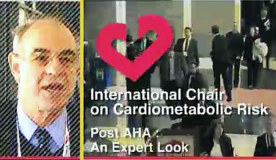
Webcast: Post-AHA 2006: An Expert Look (Part 1)
Dr. Peter Libby facilitates three sessions with renowned international experts Dr. Robert Eckel, Dr. Jean-Pierre Després, Dr. Gabriel Steg, Dr. Ronald Krauss, and Dr. Luc Van Gaal on late-breaking information on cardiometabolic risk that was presented at the AHA 2006 annual congress. The experts discuss the importance of the metabolic syndrome in cardiometabolic risk assessment … Continued See More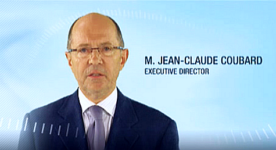
Webcast: Managing CMR
In partnership with its international members, the International Chair on Cardiometabolic Risk works to raise international awareness of global cardiometabolic risk (CMR), which is increasing in prevalence and has a negative impact on cardiovascular health. The Chair also strives to foster recognition of abdominal obesity as a driving cause of elevated global CMR as well … Continued See More
Can a consensus be reached regarding the key elements of the metabolic syndrome?
Expert opinion by Philip J. Barter, MD, MBBS, FRACP, PhD, Professor and Director, the Heart Research Institute, Sydney, Australia See More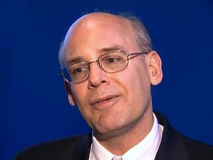
Is there a role for new markers in clinical practice?
Expert opinion by Christie Ballantyne, MD, FACC, FACP, Director, Center for Cardiovascular Disease Prevention, Chief Section of Atherosclerosis and Vascular Medicine, Methodist DeBakey Heart Center and Baylor College of Medicine, Houston, TX, USA See More
Which measures should be prioritized when assessing and managing cardiometabolic risk in Asia?
Expert opinion by Juliana Chan, MD, FRCP, Professor of Medicine and Therapeutics, Director, Hong Kong Institute of Diabetes and Obesity, The Chinese University of Hong Kong, Hong Kong SAR, China See More
What is the importance of HDL?
Expert opinion by H. Bryan Brewer, Jr., MD, Director, Lipoprotein and Atherosclerosis Research, MedStar Research Institute, Cardiovascular Research Institute, Washington, DC, USA See More
What are the anti-inflammatory properties of HDL?
Expert opinion by Philip J. Barter, MD, MBBS, FRACP, PhD, Professor and Director, the Heart Research Institute, Sydney, Australia See More
The metabolic syndrome of visceral obesity: is it overconsumption of calories or lack of physical activity?
Expert opinion by Robert Ross, PhD, Professor, School of Kinesiology and Health Studies, Department of Medicine, Division of Endocrinology and Metabolism, Queen’s University, Kingston, ON, Canada See More
What is the link between visceral obesity and hypertension? Are factors other than hyperinsulinemia involved?
Expert opinion by Benoit Arsenault, PhD, Professor, Faculty of Medicine, Université Laval, Centre de recherche de l’IUCPQ, Québec, QC, Canada See More
Is the cardiometabolic risk profile of type 2 diabetic patients significantly worse than it was 10 years ago?
Expert opinion by Luc Van Gaal, MD, PhD, Professor of Medicine, Antwerp University Hospital, Faculty of Medicine, Department of Diabetology, Metabolism & Clinical Nutrition, Antwerp, Belgium See More
Could you discuss managing hypertension among patients with visceral obesity and the metabolic syndrome?
Expert opinion by Arya Sharma, MD, FRCPC, Professor of Medicine and Chair for Obesity Research and Management, University of Alberta, Edmonton, Canada See More
Could you comment on the mechanism responsible for type 2 diabetes hypertriglyceridemia?
Expert opinion by Marja-Riitta Taskinen, MD, PhD, Professor of Medicine, University of Helsinki, Department of Medicine, Biomedicum, Helsinki, Finland See More
Is abdominal obesity important in CVD risk assessment and management in type 2 diabetes?
Expert opinion by Marja-Riitta Taskinen, MD, PhD, Professor of Medicine, University of Helsinki, Department of Medicine, Biomedicum, Helsinki, Finland See More
Editorial: Treating the patient with low HDL-cholesterol: Are we chasing the right target?
For more than three decades, lipidologists have emphasized the added value of measuring HDL-cholesterol in the evaluation of coronary heart disease (CHD) risk. There is now substantial epidemiological evidence that for any given LDL-cholesterol concentration a low HDL-cholesterol concentration is predictive of an increased risk of CHD in both men and women [1-5]. Thus, therapeutic … Continued See More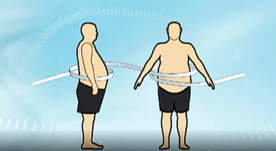
Webcast: Evaluating CMR
Global cardiometabolic risk is defined as the risk of cardiovascular disease resulting from the presence of traditional risk factors along with features of the metabolic syndrome. Cardiometabolic risk has been shown to increase with a patient’s waist size, which highlights the importance of measuring waist circumference in clinical practice and recording it in the medical … Continued See More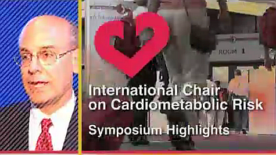
Webcast: ISA Rome 2006 Symposium Highlights
The first International Chair on Cardiometabolic Risk symposium was held during the ISA 2006 meeting in Rome. The key challenge of this first meeting was to evaluate whether global cardiometabolic risk assessment can be improved by including all traditional risk factors as well as the metabolic syndrome and abdominal obesity. The clip includes comments by … Continued See More
What is cardiometabolic risk, and is it a new term to replace the metabolic syndrome?
Expert opinion by Jean-Pierre Després, PhD, FAHA, FIAS, Scientific Director, International Chair on Cardiometabolic Risk, Professor, Division of Kinesiology, Université Laval, Centre de recherche de l’Institut universitaire de cardiologie et de pneumologie de Québec, Québec, QC, Canada See More
What is the relationship between physical activity and the metabolic syndrome?
Expert opinion by Jean-Pierre Després, PhD, FAHA, FIAS, Scientific Director, International Chair on Cardiometabolic Risk, Professor, Division of Kinesiology, Université Laval, Centre de recherche de l’Institut universitaire de cardiologie et de pneumologie de Québec, Québec, QC, Canada See More
Does the metabolic syndrome exist?
Expert opinion by Jean-Pierre Després, PhD, FAHA, FIAS, Scientific Director, International Chair on Cardiometabolic Risk, Professor, Division of Kinesiology, Université Laval, Centre de recherche de l’Institut universitaire de cardiologie et de pneumologie de Québec, Québec, QC, Canada See More
There is evidence that BMI values associated with increased type 2 diabetes and CVD risk are lower in Asia than in the rest of the world. Which factors explain this discrepancy? What about the role of visceral adiposity?
Expert opinion by Juliana Chan, MD, FRCP, Professor of Medicine and Therapeutics, Director, Hong Kong Institute of Diabetes and Obesity, The Chinese University of Hong Kong, Hong Kong SAR, China See More
What role does lack of physical activity play in the etiology of the metabolic syndrome?
Expert opinion by Jean-Pierre Després, PhD, FAHA, FIAS, Scientific Director, International Chair on Cardiometabolic Risk, Professor, Division of Kinesiology, Université Laval, Centre de recherche de l’Institut universitaire de cardiologie et de pneumologie de Québec, Québec, QC, Canada See More
Do you believe that the metabolic syndrome is as much of an issue in Asia as it is in North America?
Expert opinion by Juliana Chan, MD, FRCP, Professor of Medicine and Therapeutics, Director, Hong Kong Institute of Diabetes and Obesity, The Chinese University of Hong Kong, Hong Kong SAR, China See More
Is there a distinction to be made between the insulin resistance syndrome and the metabolic syndrome? Are they the same thing?
Expert opinion by Jean-Pierre Després, PhD, FAHA, FIAS, Scientific Director, International Chair on Cardiometabolic Risk, Professor, Division of Kinesiology, Université Laval, Centre de recherche de l’Institut universitaire de cardiologie et de pneumologie de Québec, Québec, QC, Canada See More
What role does exercise/physical activity play in the management of abdominal obesity?
Expert opinion by Jean-Pierre Després, PhD, FAHA, FIAS, Scientific Director, International Chair on Cardiometabolic Risk, Professor, Division of Kinesiology, Université Laval, Centre de recherche de l’Institut universitaire de cardiologie et de pneumologie de Québec, Québec, QC, Canada See More
What is the importance of adipose tissue as an endocrine organ?
Expert opinion by Max Lafontan, PhD, Research Director, INSERM, Laboratoire de Recherche sur les Obésités, U858, Institut de Médecine Moléculaire de Rangueil, Toulouse, France See More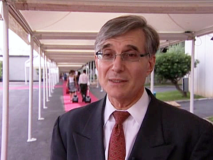
What is the relationship between an inflammatory state and atherosclerotic plaques?
Expert opinion by Peter Libby, MD, Mallinckrodt Professor of Medicine, Harvard Medical School and Chief, Cardiovascular Medicine, Brigham & Women’s Hospital, Boston, MA, USA See More
What are the clinical implications of the dysmetabolic profile of lipodystrophic patients? How does this affect the key causes of the metabolic syndrome?
Expert opinion by Stephen O’Rahilly, MD, FRCP, FRS, Head of Department and Professor of Clinical Biochemistry and Medicine, University of Cambridge, Cambridge, UK See More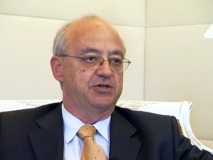
Could the endocannabinoid system be a major player in the etiology of liver steatosis?
Expert opinion by George Kunos, MD, PhD, Research Scientist, Bethesda, MD, USA See More
Could you comment on the importance of having a normal adipose tissue mass?
Expert opinion by Max Lafontan, PhD, Research Director, INSERM, Laboratoire de Recherche sur les Obésités, U858, Institut de Médecine Moléculaire de Rangueil, Toulouse, France See More
Is there evidence for a direct role of endocannabinoids on cardiovascular disease?
Expert opinion by George Kunos, MD, PhD, Research Scientist, Bethesda, MD, USA See More
Which factors/markers do you think will emerge as key predictors of global CMR beyond the Framingham risk score?
Expert opinion by Scott M. Grundy, MD, PhD, Distinguished Chair in Human Nutrition, UT Southwestern Medical Center, Dallas, TX, USA See More
Are visceral obesity, liver fat infiltration, and dysfunctional adipose tissue related?
Expert opinion by Scott M. Grundy, MD, PhD, Distinguished Chair in Human Nutrition, UT Southwestern Medical Center, Dallas, TX, USA See More
How feasible do you think it will be to incorporate imaging technologies in the assessment of patients’ global CVD risk?
Expert opinion by John J. Kastelein, MD, Professor of Medicine and Chairman of the Department of Vascular Medicine at the University of Amsterdam, Amsterdam, The Netherlands See More
What are the consequences of the obesity epidemic?
Expert opinion by Christie Ballantyne, MD, FACC, FACP, Director, Center for Cardiovascular Disease Prevention, Chief Section of Atherosclerosis and Vascular Medicine, Methodist DeBakey Heart Center and Baylor College of Medicine, Houston, TX, USA See More
What is the atherogenic dyslipidemia of visceral obesity?
Expert opinion by John D. Brunzell, MD, Professor of Medicine-Emeritus, active, University of Washington, Department of Medicine, Division of Metabolism, Endocrinology and Nutrition, Seattle, WA, USA See More
Could you comment on the epidemic proportions reached by type 2 diabetes in Asia? Is abdominal obesity a factor?
Expert opinion by Juliana Chan, MD, FRCP, Professor of Medicine and Therapeutics, Director, Hong Kong Institute of Diabetes and Obesity, The Chinese University of Hong Kong, Hong Kong SAR, China See More
What is the status of the debate on the metabolic syndrome?
Expert opinion by Philip J. Barter, MD, MBBS, FRACP, PhD, Professor and Director, the Heart Research Institute, Sydney, Australia See More
Which mechanisms are responsible for the link between visceral obesity and atherogenic dyslipidemia?
Expert opinion by John D. Brunzell, MD, Professor of Medicine-Emeritus, active, University of Washington, Department of Medicine, Division of Metabolism, Endocrinology and Nutrition, Seattle, WA, USA See More